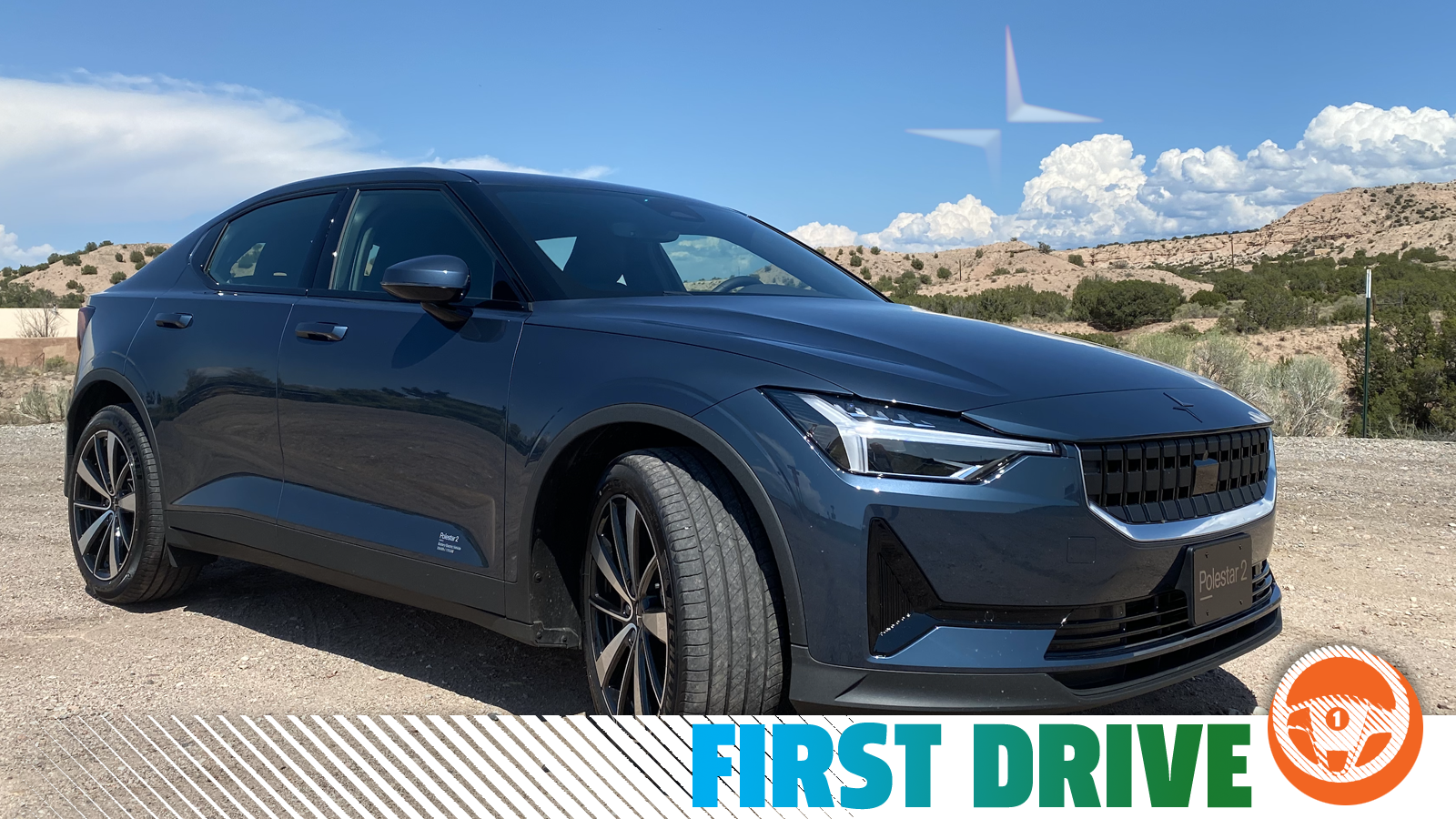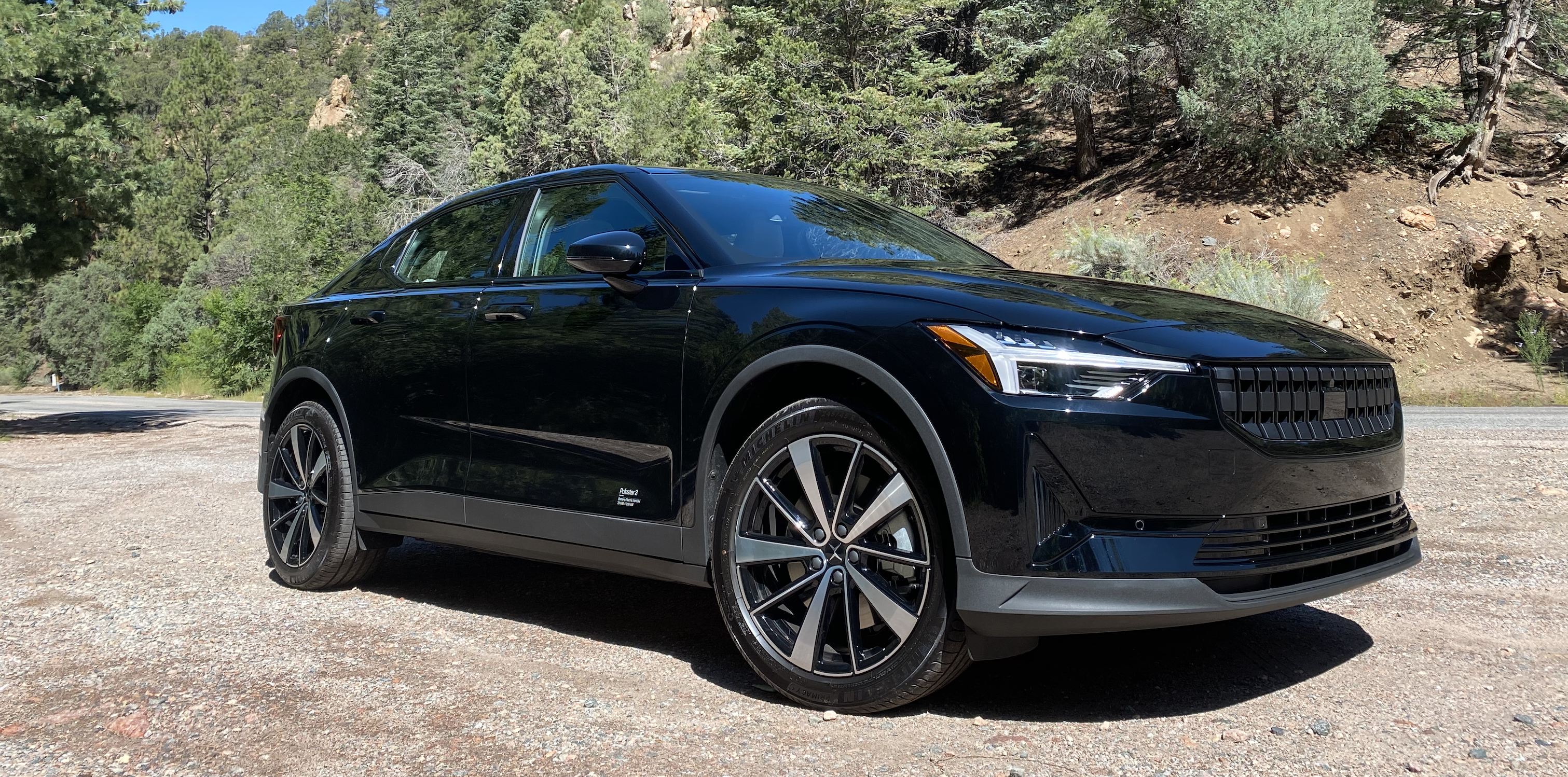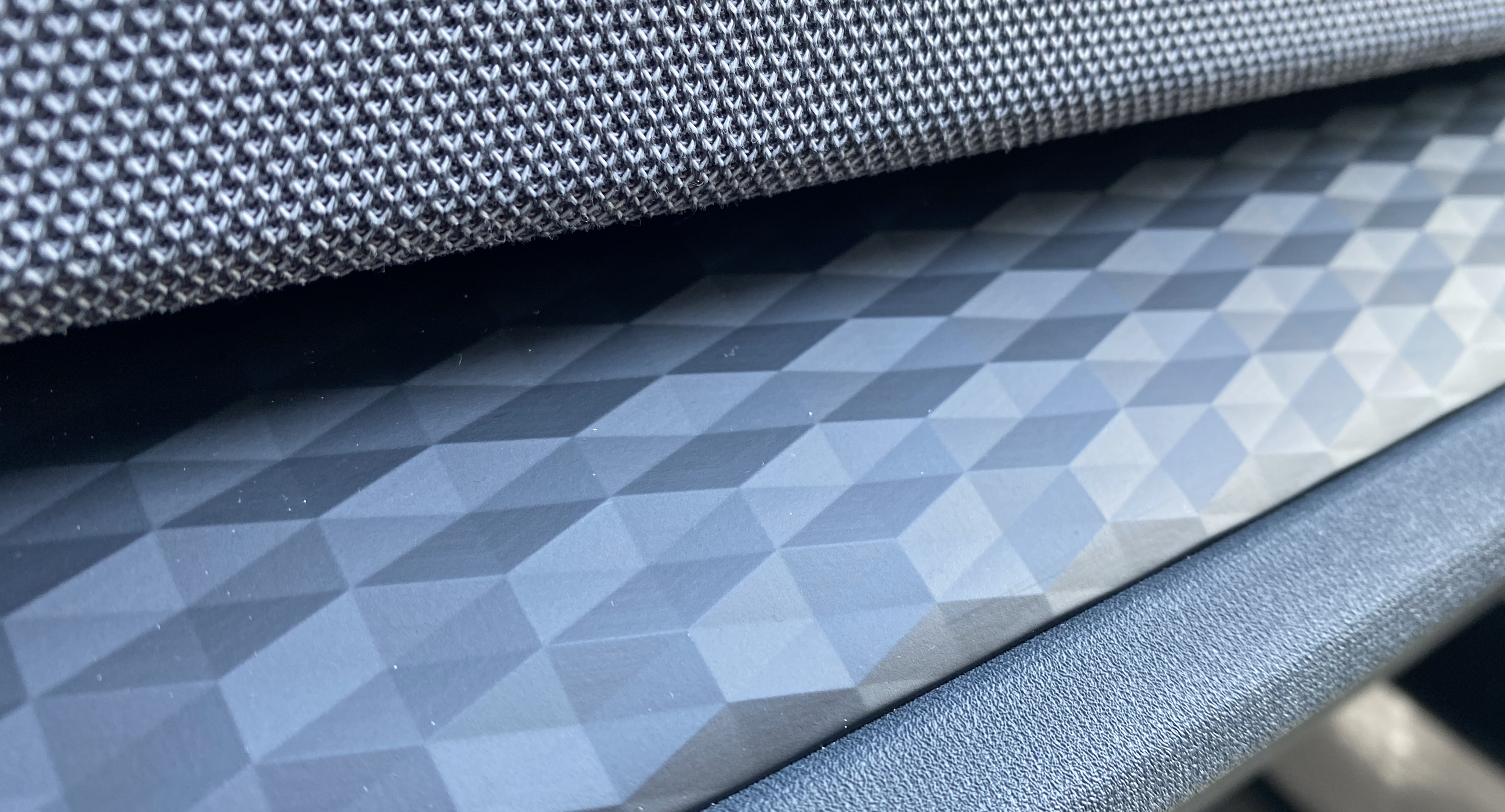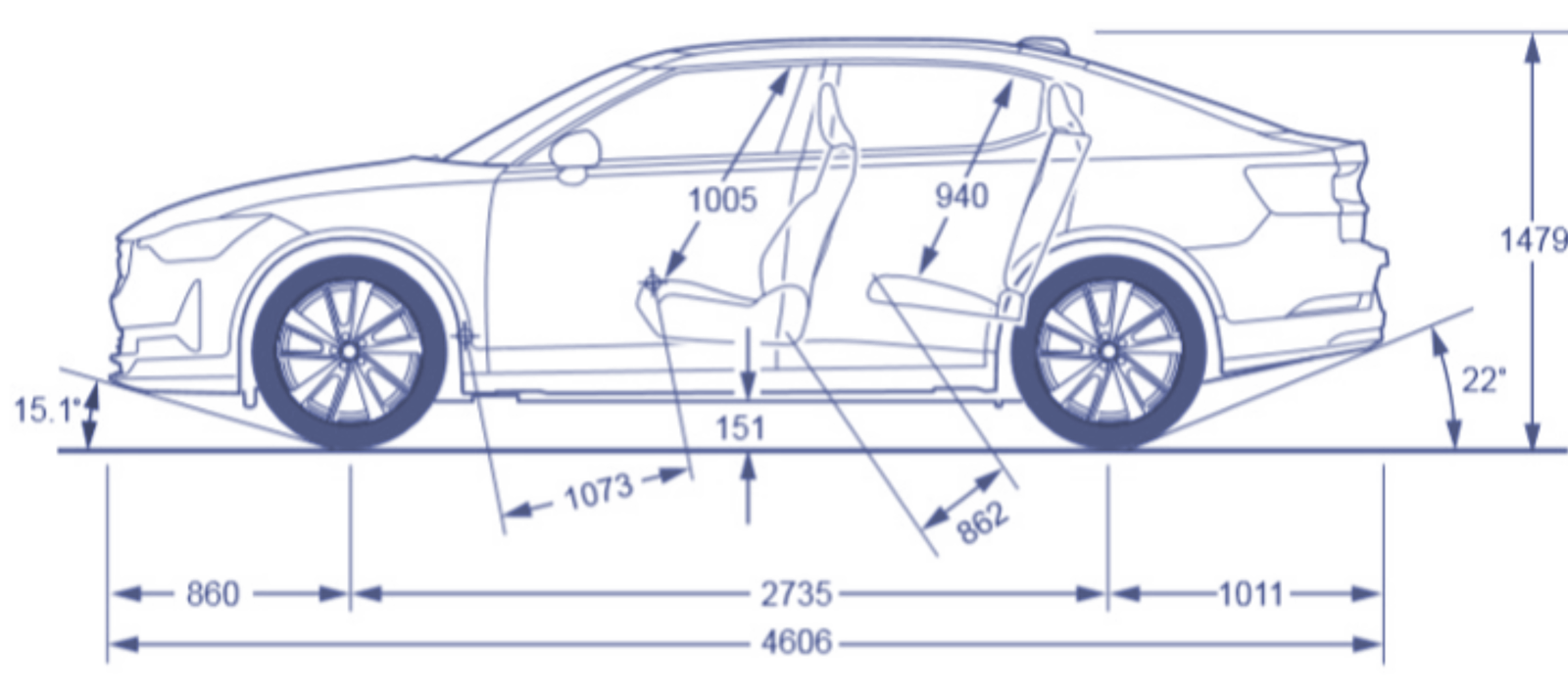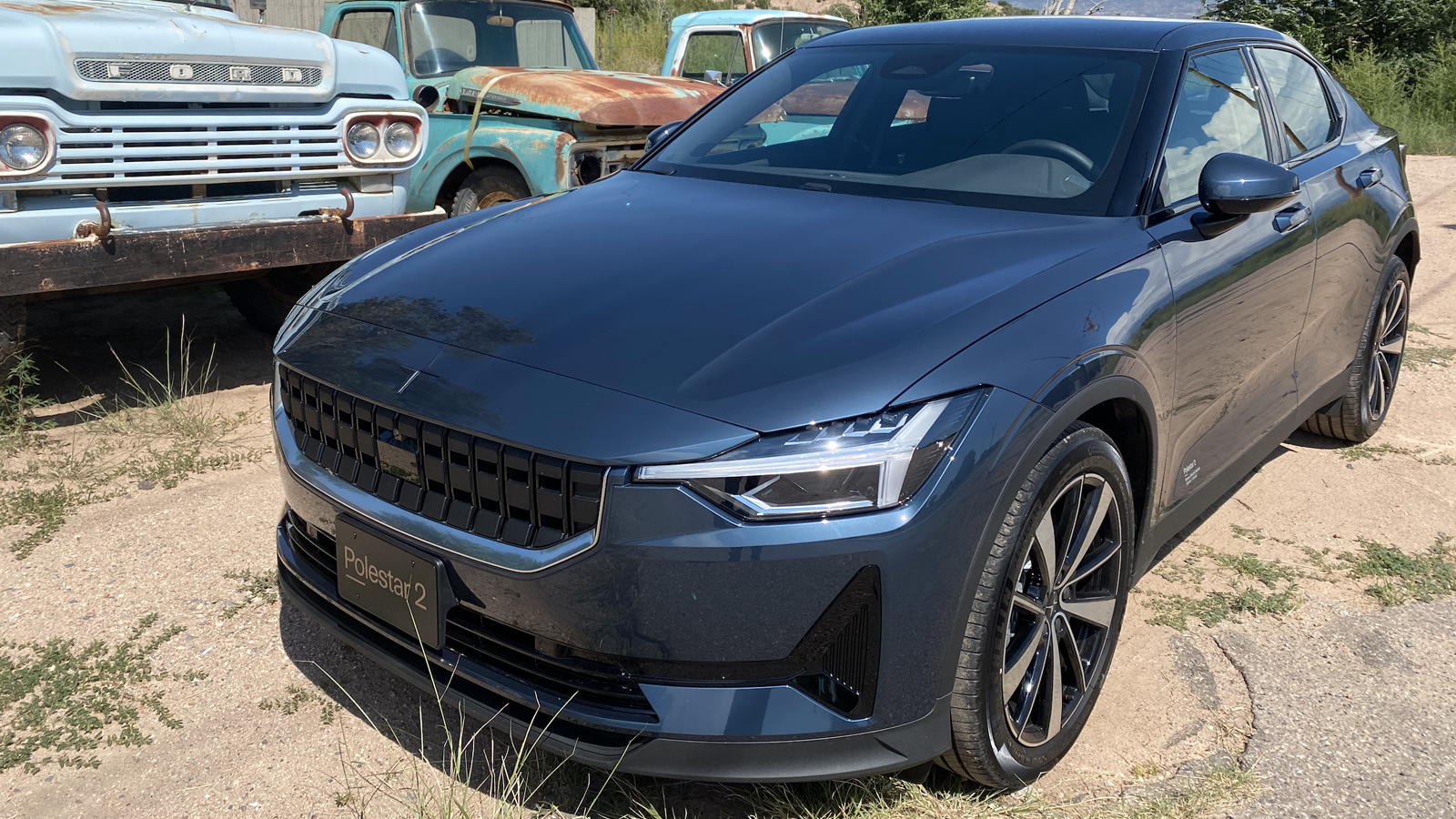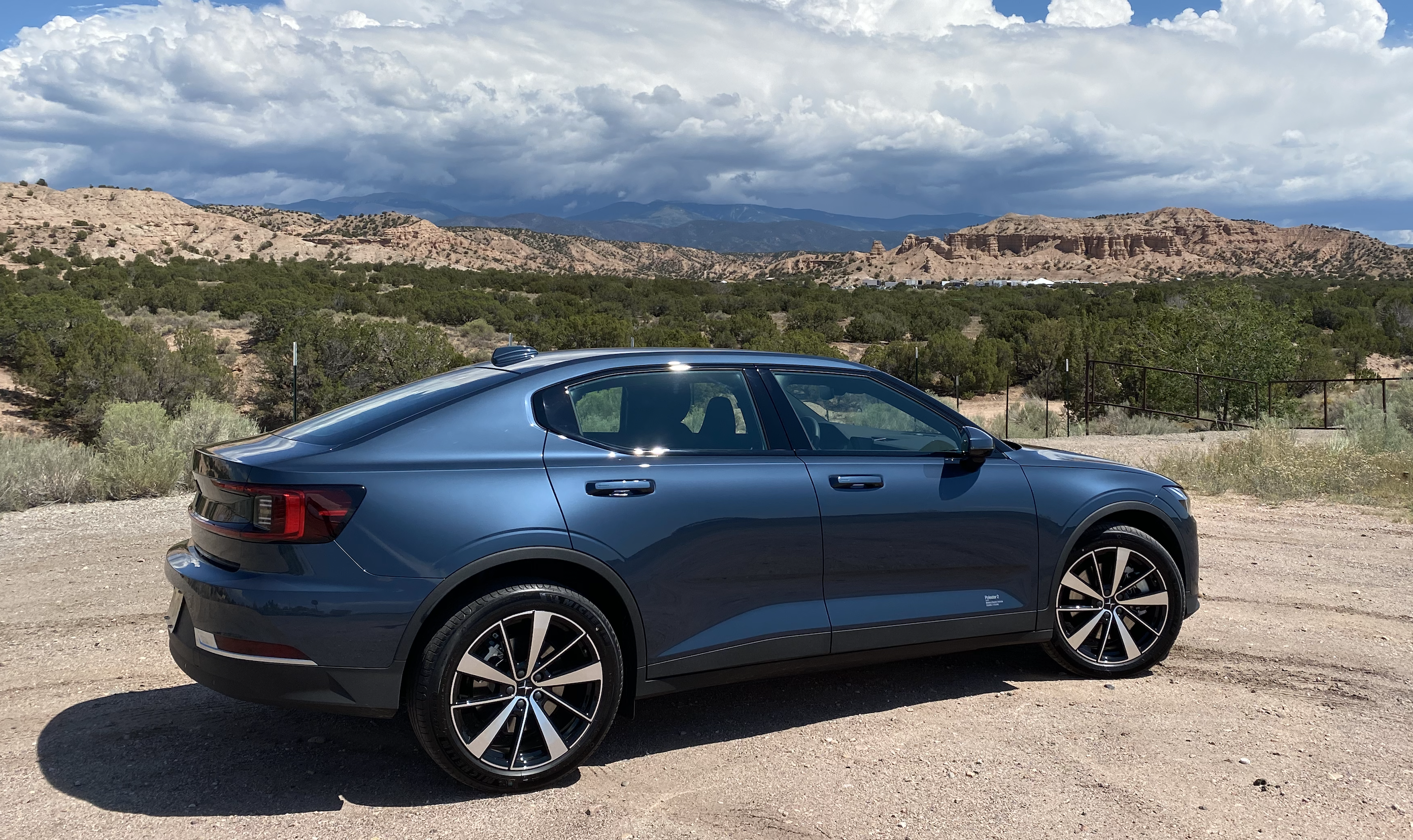The 2022 Polestar 2: First Drive Of The Second Polestar
This is a good-looking, interesting EV that has potential to be a viable Tesla Model 3 competitor even if its company doesn't really want to say it
You can't say that Polestar, the premium electric car brand Chinese parent company Geely spun off from Volvo — very much the Rhoda to Volvo's Mary Tyler Moore — doesn't have a way with names. First came the hybrid-electric Polestar 1, and now there's the battery-electric five-door sedan, the Polestar 2. The name 2 is very evocative — we humans have 2 of many things: nostrils, hands, feet, eyes, anuses — all the important things, so it makes sense to name a car after this most secondest number. It's a pretty damn good car, too; not without its flaws, but overall a very welcome EV non-SUV option. And I got to drive one.
(Full Disclosure: Polestar flew me out to Santa Fe, the city named for a Hyundai and full of near-identical-looking beige oblong buildings, and let me drive both the single- and dual-motor Polestar 2s. They fed me and didn't make fun of me to my face.)
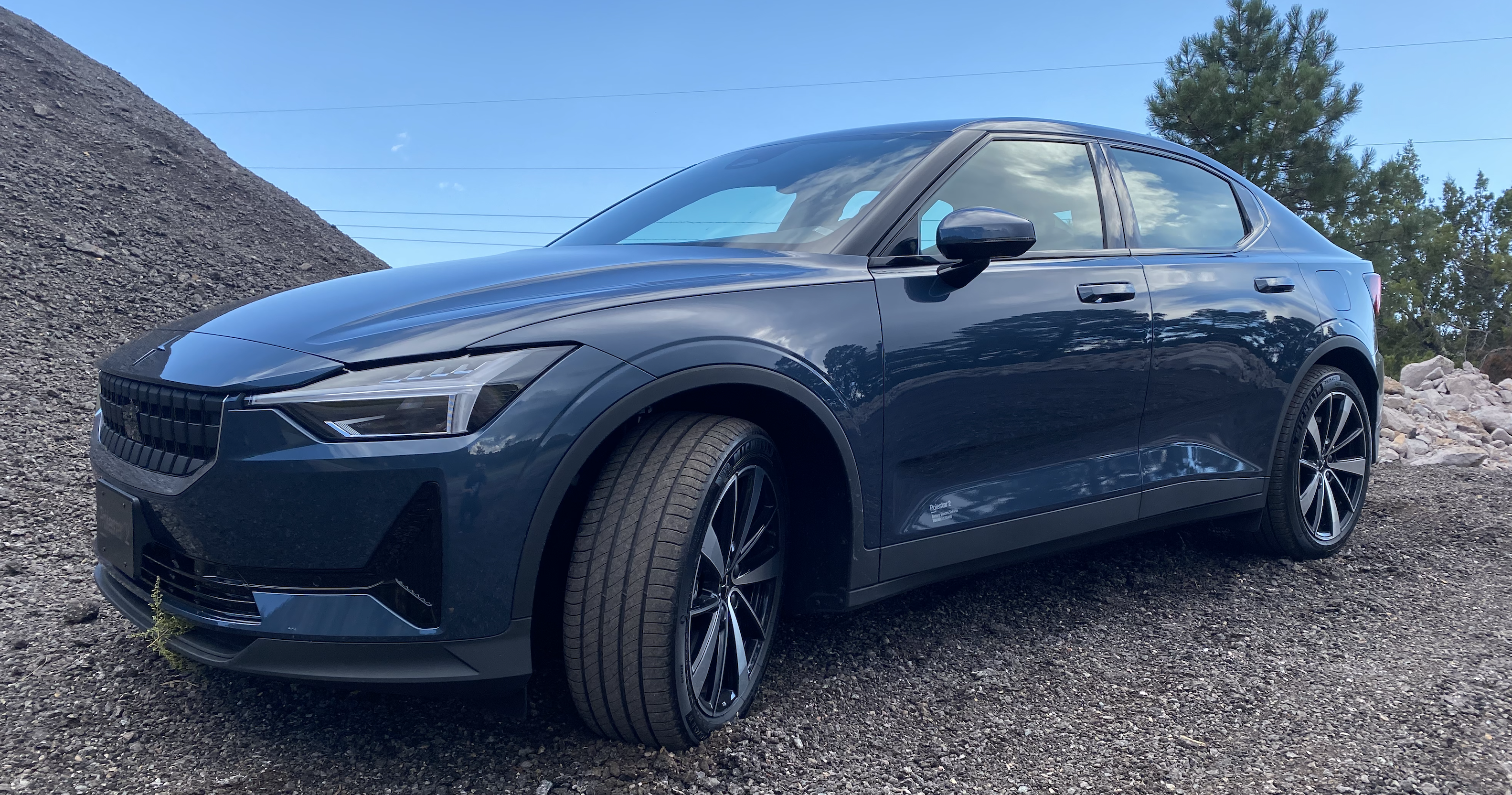
Before I get into the specifics of the car itself, let's talk a little about how Polestar sees itself as a brand, since I had to sit through a lot of that sort of talk and why shouldn't you suffer a little, too?
Polestar was once the name of Volvo's racing division, and the Polestar 2 actually started life as a Volvo concept car called the Concept 40.2. The nice Polestar people tried to explain to my why the car that became the Polestar 2 couldn't have been a Volvo, and said something about how Volvo was warm and safe and cocooning and humanistic, and that's not exactly what Polestar would be.
Now I don't think they meant that Polestar is anti-humanistic and unsafe and cold, but I think they want Polestar to feel more, I suppose, high-tech and precise and crafted. These are harder, more rational values than the softer, warmer Volvo ones.
I guess. It's all faintly ridiculous, really, but all brands are.
More surprising is what Polestar sees as their main competitor. All logic would suggest that the Polestar 2 is an ideal Tesla Model 3 rival, but Polestar insists Porsche is their main target.
Porsche? Did anyone tell Porsche this? I really can't figure out why Polestar would be targeting Porsche. Other than both being electric sedans with good performance, it didn't remind me of Porsche's Taycan at all, and that's by far the most likely Porsche to get cross-shopped.
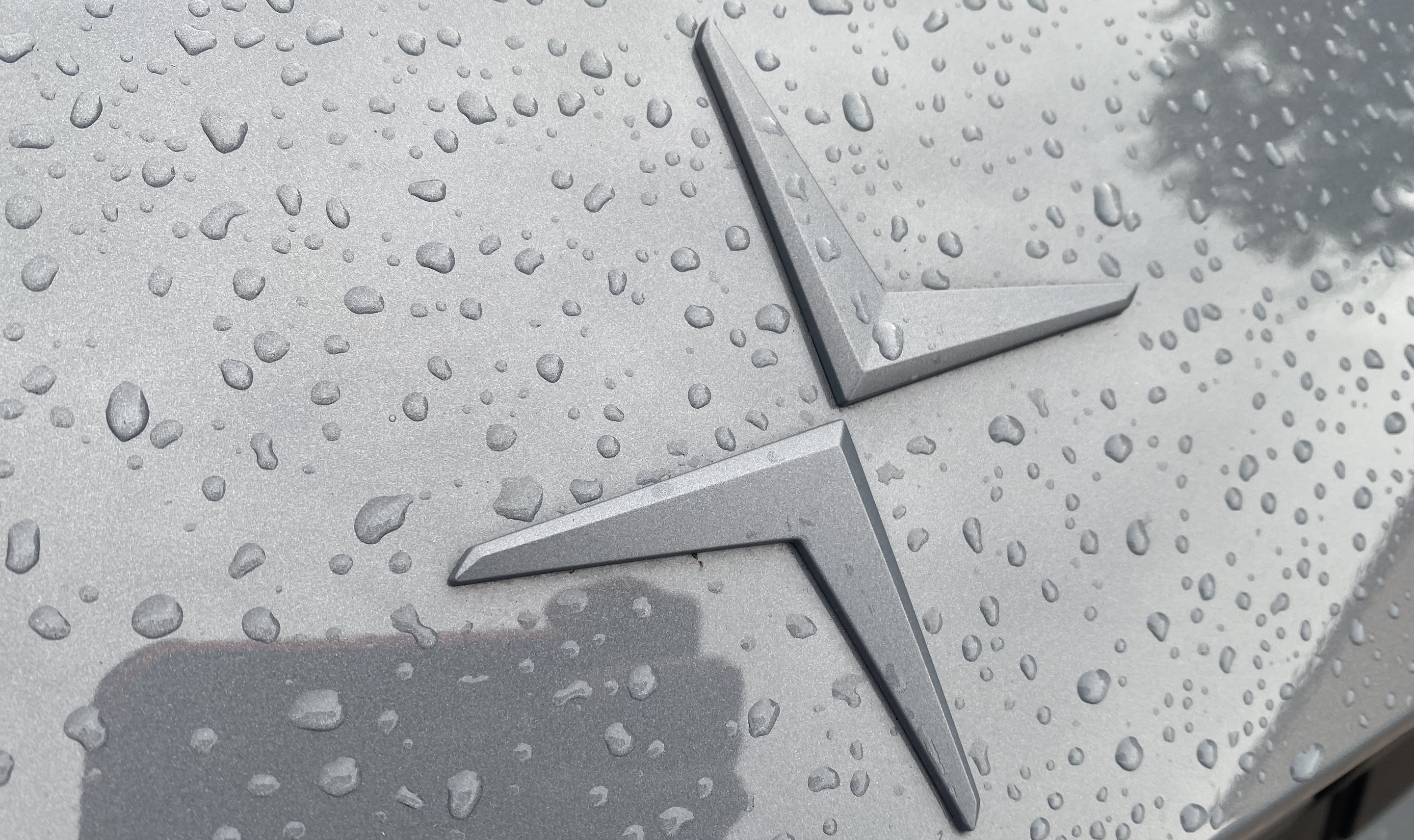
Still, who am I to tell Polestar how to see itself? It's doing a good job with general brand identity, I think, with a distinct visual style and an appealing logo that looks like they pried off the double chevrons from a junked Citroën and re-arranged them into a star shape.
This distinctive identity will carry over into how Polestars will be sold: in their own specially-designed and constructed stores, called "Spaces," which have a sort of Apple Store minimalism meets Swedish design. Polestar said it'll have 30 Spaces by the end of the year in America, which is one per state, if my math and sources check out.
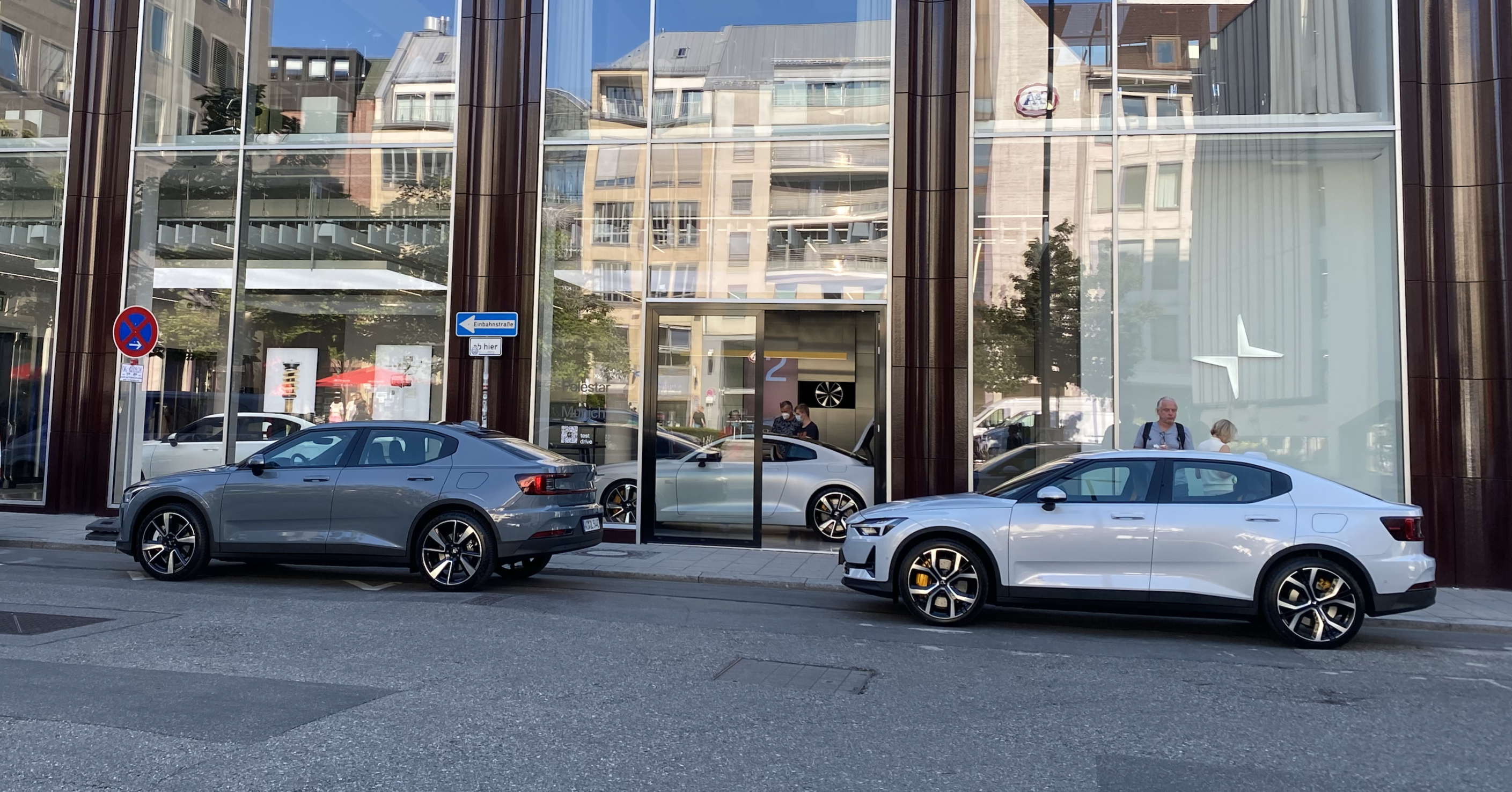
That, or you can order online, the same way you get almost everything else.
Servicing will be done via Volvo dealerships, so there's already a good-sized network in place.
From what I can gather by the car, corporate design, and general tone, Polestar wants to be something smart and serious; a well-engineered machine sold to people who give a shit about well-engineered machines. In this space, that could play well.
Okay, let's talk about the car.
How’s it look?
Because of the fundamental technical nature of electric cars, they all have pretty much the same basic drivetrain characteristics: lots of torque from zero RPM, generally quite quick, minimal noise, and so on. Sure, there's going to be differences in 0 to 60 times and range that sort of thing, but the essential technical similarity means the other aspects of a car beyond just the specs become that much more important.
These other aspects can be packaging, user experience and interface design of the controls and infotainment system and, of course, how the car looks. The external design of the Polestar I think is one of its strongest attributes, a bold, clean, decisive design that actually stands out from the vast sea of near-indistinguishable SUVs and crossovers that dominate the modern carscape.
Even though it's not an SUV, the Polestar 2 wants to provide the same high "command" driving position that drivers seem to want, and as a result this four-door sedan with a hatch gets unusual proportions, a smaller body on bigger tires, and evokes some unusual aesthetic predecessors:
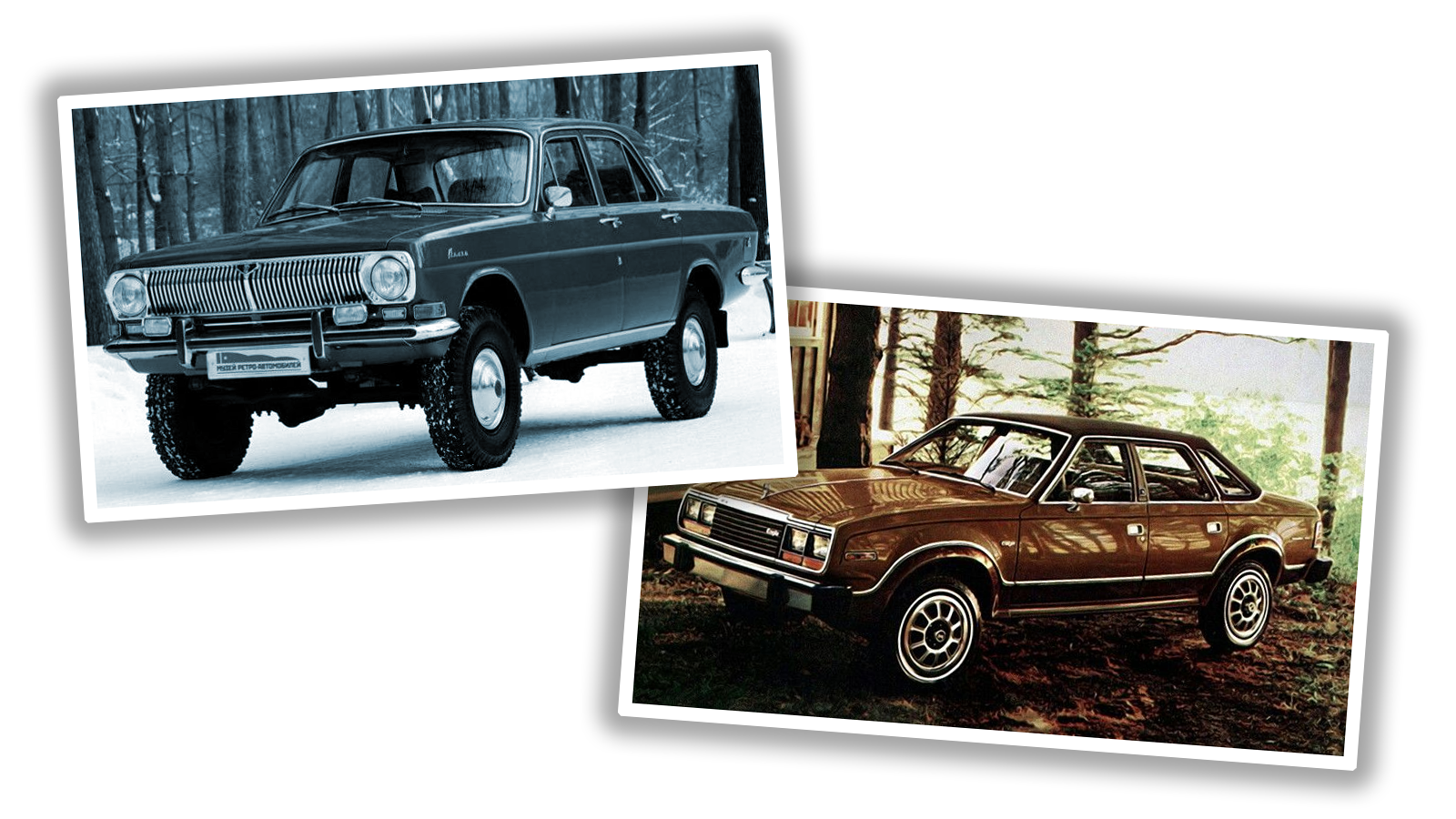
Yes, an AMC Eagle and a Volga 4x4 were the cars that first popped into my head when looking at the Polestar 2. And — I can't stress this enough — this is a positive thing.
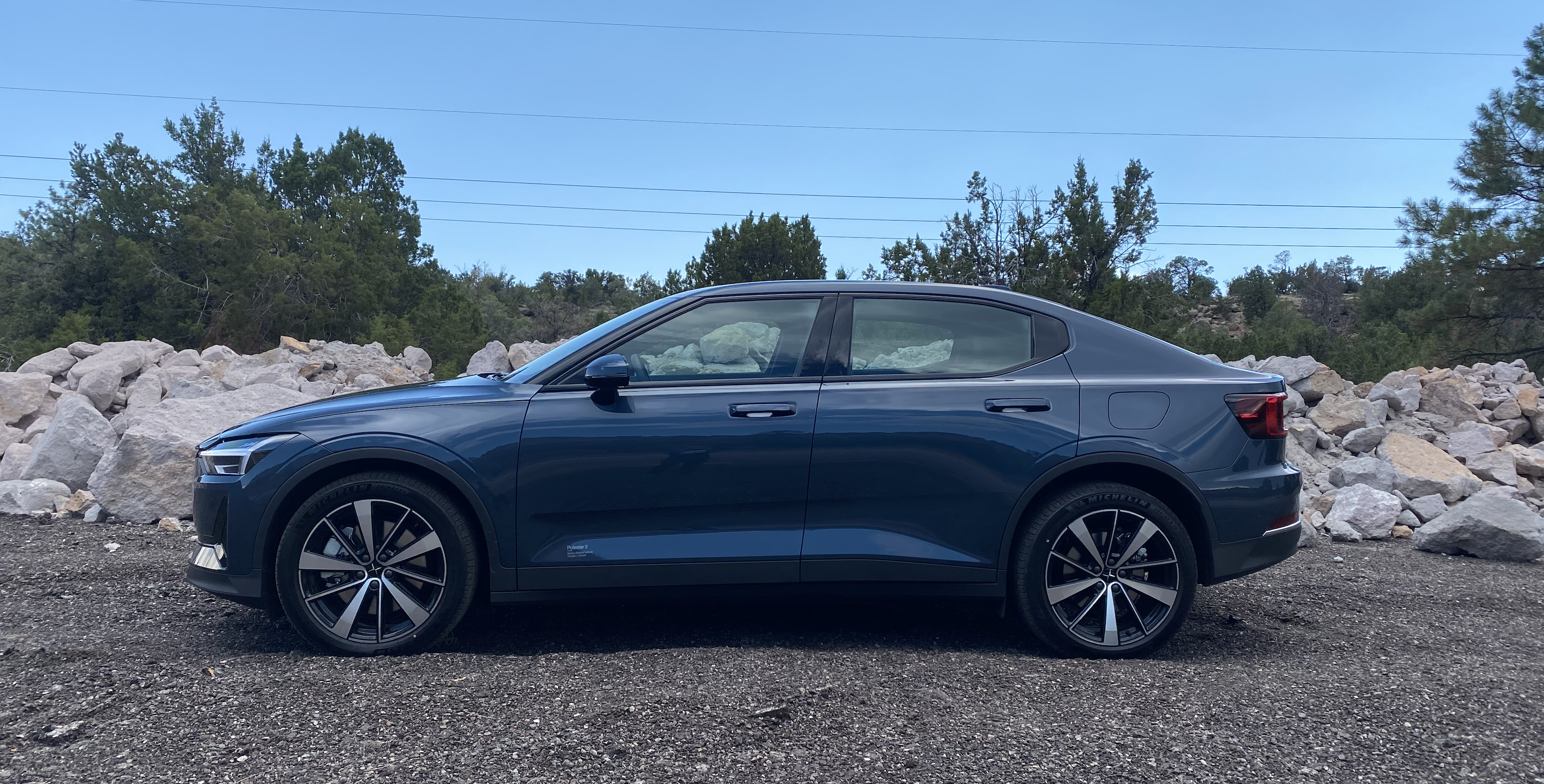
There's something appealing about a crisp, tailored sedan wearing big boots. It gives some pleasing proportional tension, bulky and muscular while lithe and lean. It's not the easiest thing to reconcile well, but I think Polestar's designers have done a really great job.
The car has a strong shoulder line, and then a nice Loewy-style Coke-bottle curve in its midsection to keep it lean, allowing itself to get chunky again at the rear.
The greenhouse isn't especially tall, but it's not absurdly low, and slopes down to a pleasing fastback design.
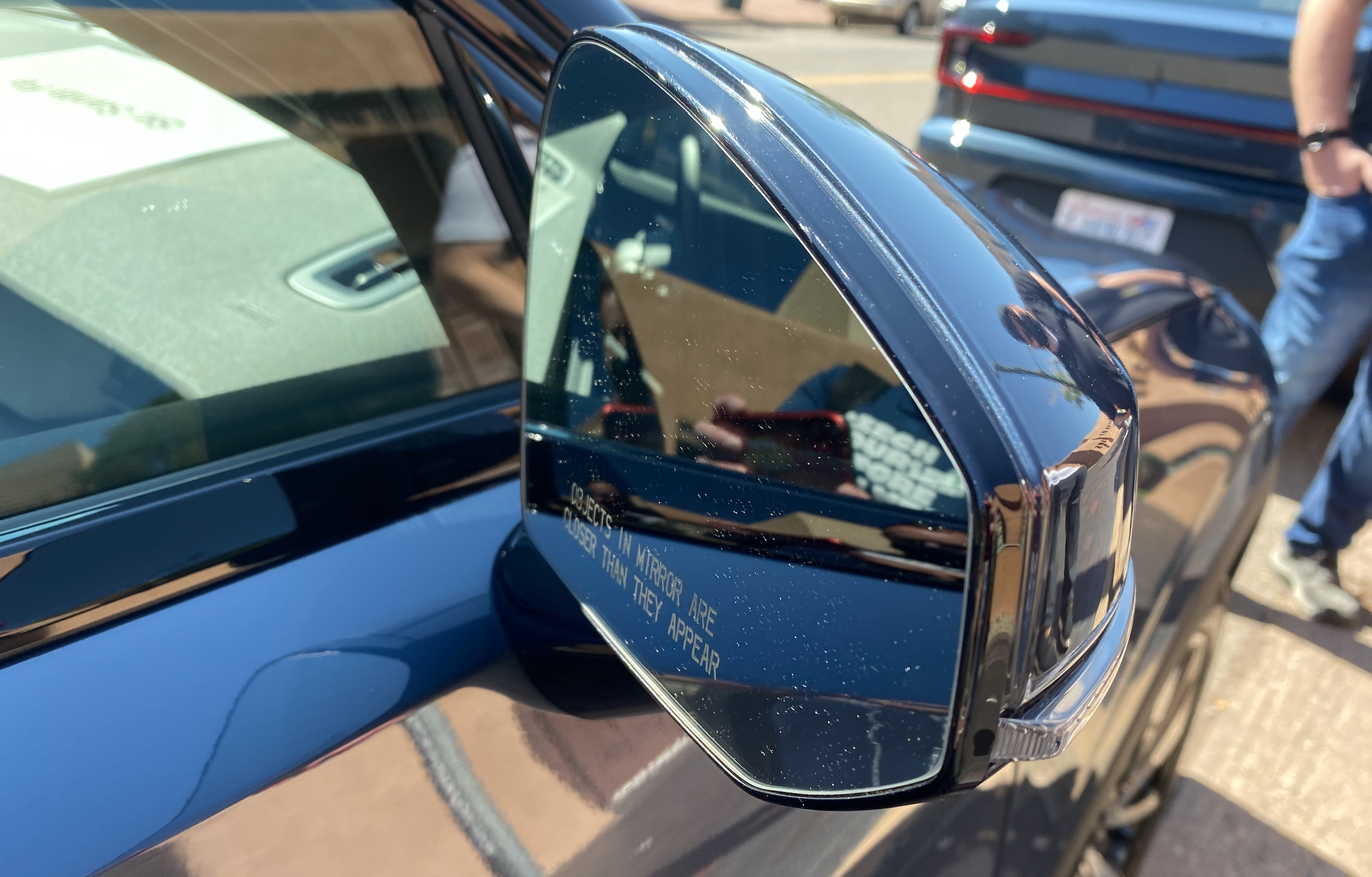
The side mirrors are especially nice. They're frameless, and it's surprising how much this detail catches your attention, making one realize just how used we've all gotten to big, clunky, hooded side mirrors.
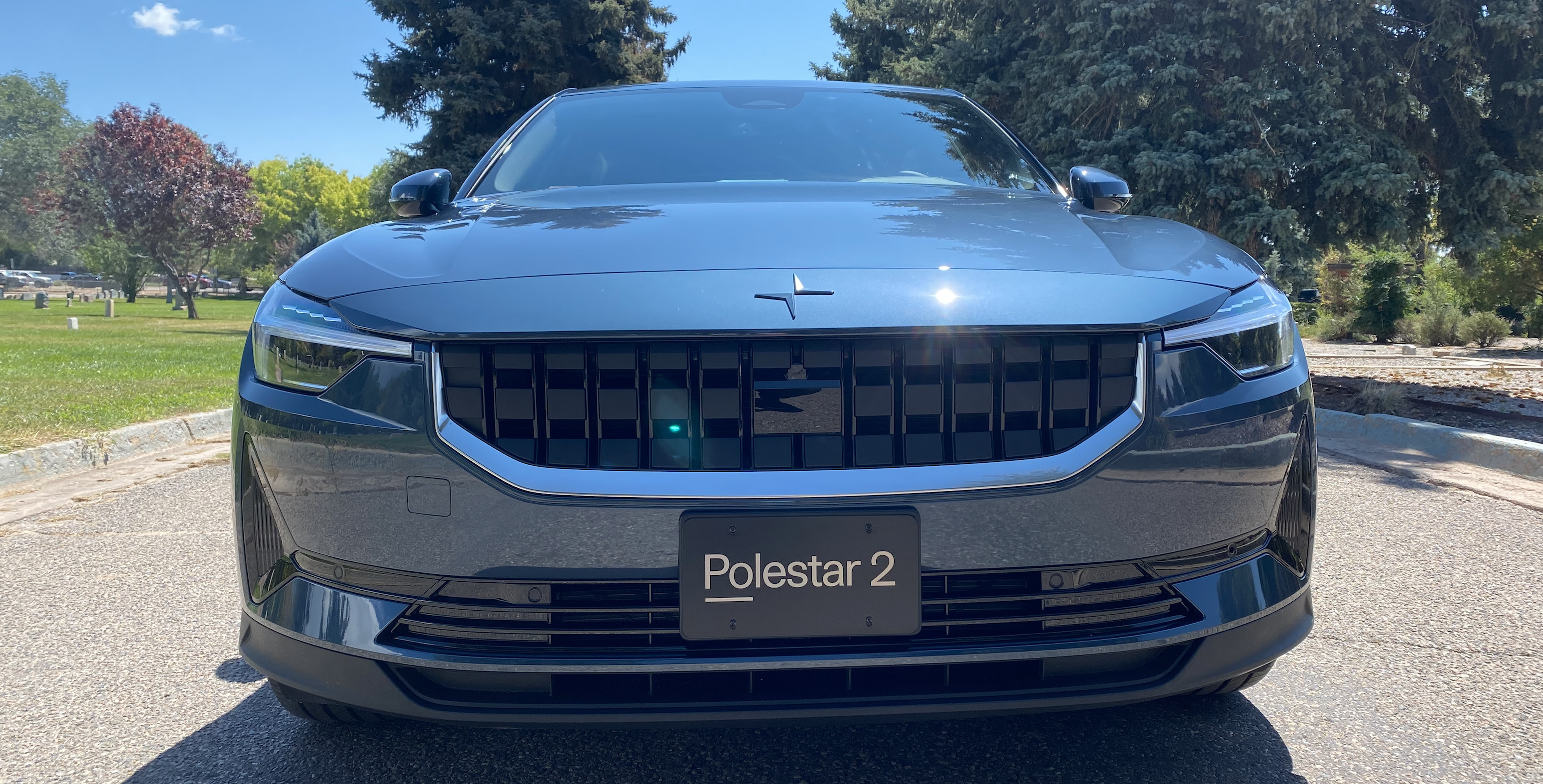
The front end has real character, too, and avoids the current trends of appearing overly ornate. It's not baroque or overdone. The upper grille — which is all real, air-intaking grillework, by the way — feels like a toothy grin, a sort of grin that knows something and is challenging you to find out.
Inside that grille you can see the radar transceiver, not so much hidden as it is camouflaged among all those other black squares. The grille gets some delineating brightwork on its inner lip, and is flanked by a pair of very Volvo-style Thor's Hammer headlights. They incorporate Volvo's Pixel dynamic lighting tech that I think is still not permitted in America, foolishly.
Those headlights are also eye-wateringly expensive, but that's kind of the sad reality of almost all modern cars.
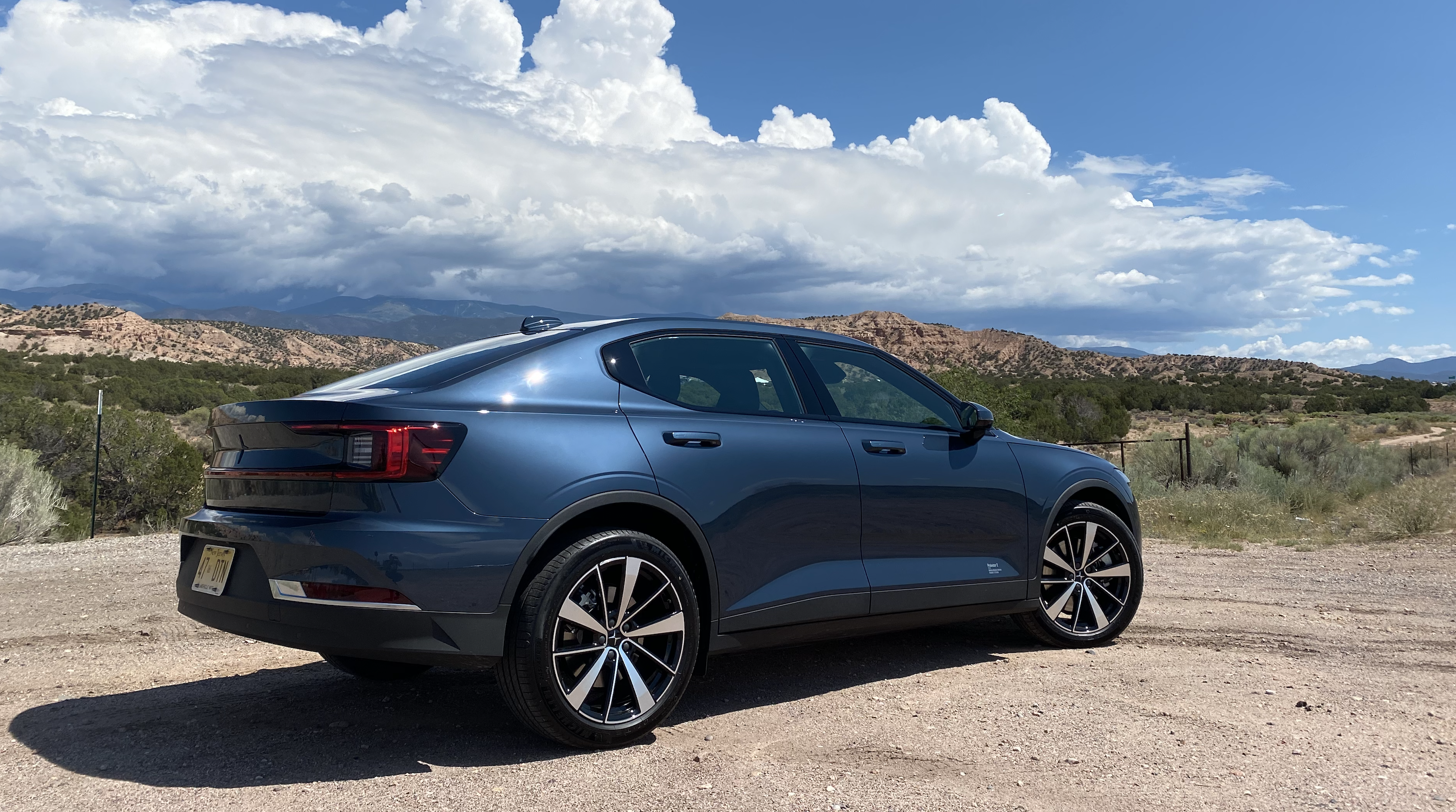
From the rear, a very graphic full-width taillight setup curls up into square-bracket-like curves at either side, the red heckblende cradling the indicators (which are amber) and reverse lamps within.
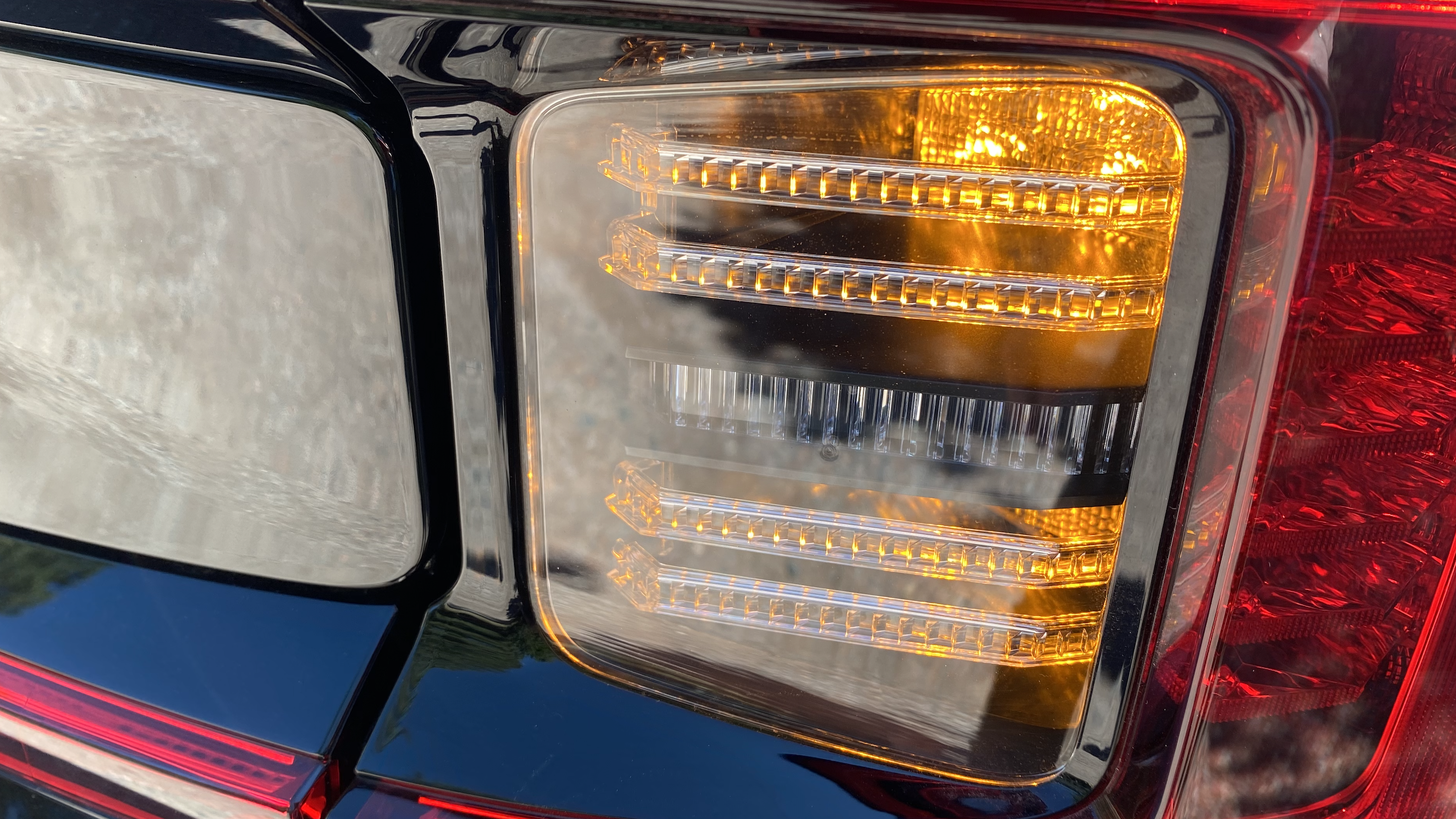
As a whole, the exterior design is perhaps my favorite aspect of the Polestar. It doesn't feel like every other wind-tunnel-birthed lozenge out there, and carries itself with unusual confidence and presence. I like it a lot.
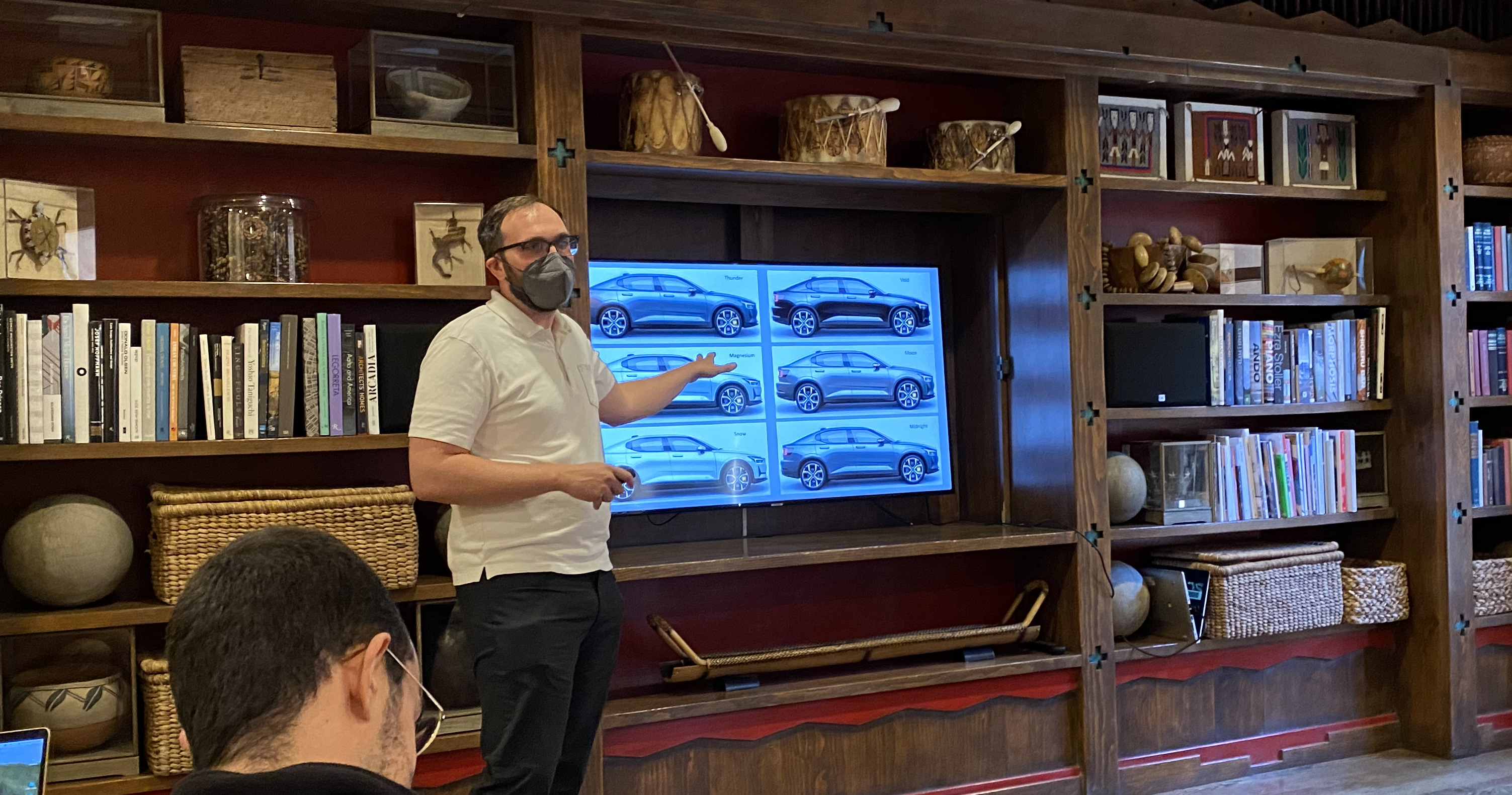
That said, I think Polestar is really dropping the ball, chromatically, on the 2. When they talked about the colors available, I actually mildly lost it and yelled at the poor, undeserving Polestar rep that no, none of those were "colors."
Here's a bigger version of what he's showing us and euphemistically calling colors:
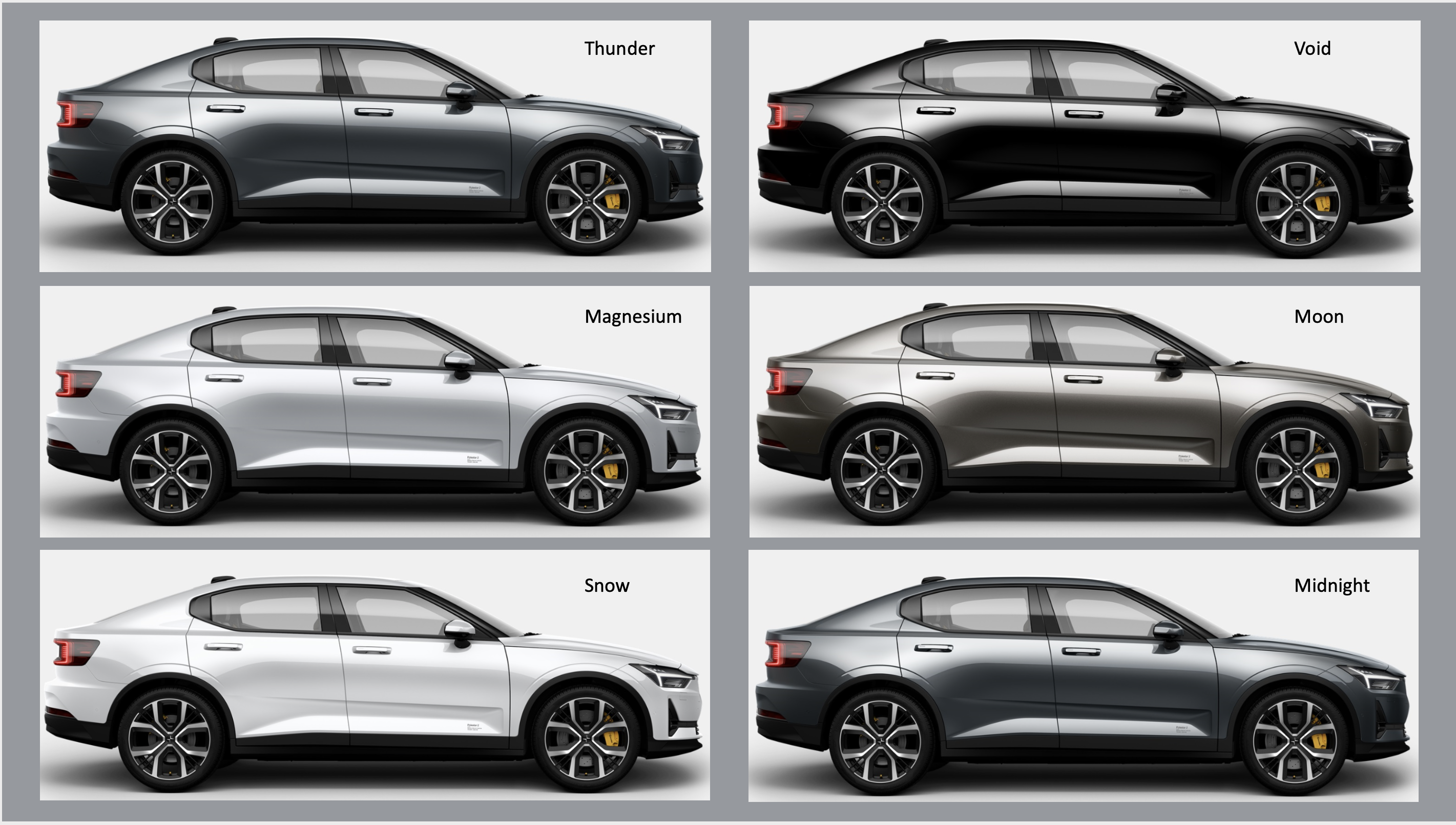
These are four grays, a white and a black. Snow? Midnight? Moon? Magnesium? Fucking Void? None of these things are about color. This is ridiculous. The Polestar 2's design could look fantastic in that traditional Volvo bright racing blue, or a nice deep yellow, or a red, or orange, or, well, pretty much anything except another fucking grayscale uncolor.
The worst offender is the black — sorry, the Void color, which hides all of the good lines and details of the car. Avoid Void.
That said, Polestar does offer some great wheel options, especially that 20-inch Y or V-spoke design on the right here:

I think Polestars will get noticed for their design in a positive way when out in the world, and that's a worthy achievement in today's automotive visual landscape.
What about the inside and the packaging?
I'm a bit conflicted on the interior of the Polestar 2; it got a lot of really great qualities and elements, but a few notable issues, too.
On the good side, the materials used all over are excellent, with some nice non-traditional and unexpected choices. There's "3d etched" trim panels that evoke the awe-inspiring cuboid pyramids of the wild and untamable Q-Bert, or "re-constructed black ash" trim that's made from recycled wood. Maybe it's old Ikea dressers or something. They both look great.
All of the interior materials and upholstery were selected to be as sustainable as possible, and if you go for the seats that are upholstered in this stuff that feels kind of like a wetsuit (it's actually quite good, I liked it) instead of the optional leather, then it's all vegan, in case you were considering eating your car and didn't want to give up your principles.
The interior is somewhat let down chromatically again because of Polestar's weird fixation on grayscale non-colors. The options are Charcoal or Slate, which, when you're actually in the car, just read as "gray." Very gray. It's kind of like a joke, asking some one to pick between Charcoal or Slate. It'd be like if two football teams were playing, and you asked which side was which, and you were told that the home team is in beige and the visiting team is taupe.
There is a tan leather option that lightens things up a lot, but I didn't get to test one of those.
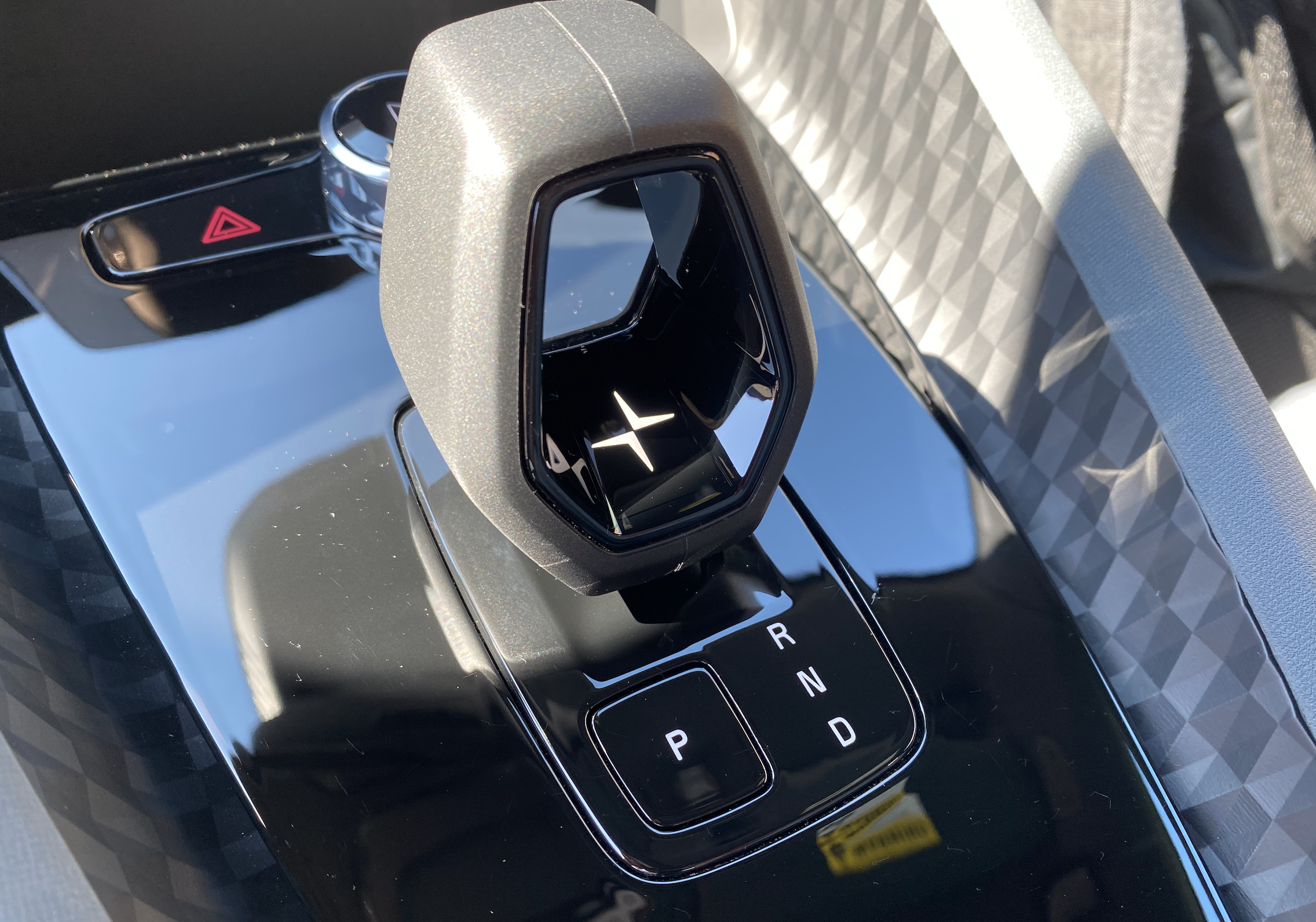
The gear selector is an especially nice little detail in the interior, all open and with a little Polestar um star illuminated in the inside there. It feels kind of like a tiny modernist Lutheran cathedral from, like, Helsinki.
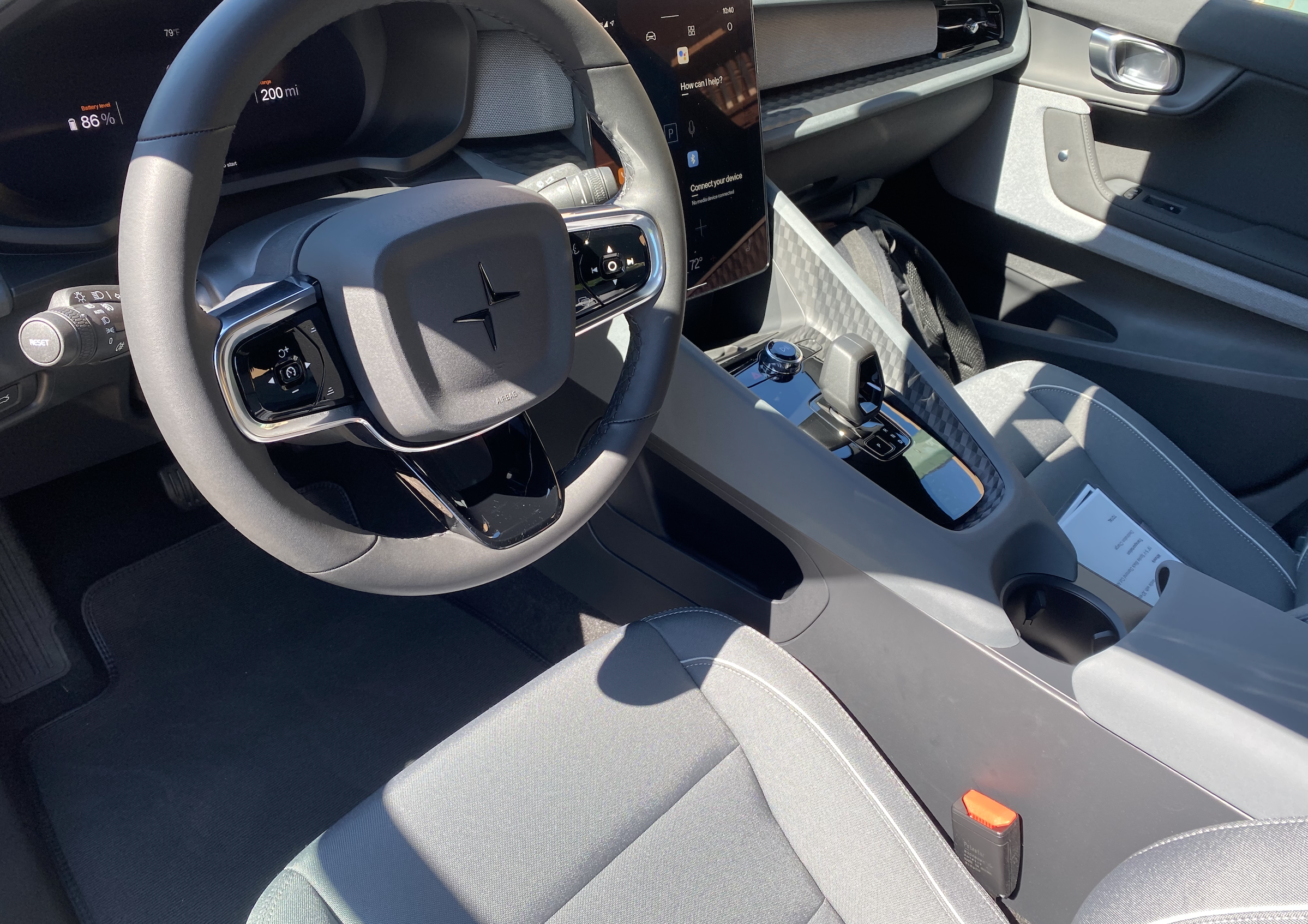
This is the crux of my problem with the Polestar interior: the fit and finish and build quality are excellent, the materials feel great, but it can all just get so dark and monochrome that you just can't really see or appreciate any of what's going on inside.
That, along with the dark gray headliner, can make the interior feel more cramped and cave-like than it needs to be. It's not uncomfortable, and while a lot of the elements feel sort of bulky, like the center console up front, the window pillars, and so on, its got decent room, but it just doesn't feel very open or airy.
Some people may like this, and find it cozy or protective, but I thought it was a bit claustrophobic, and the rearward visibility isn't great.
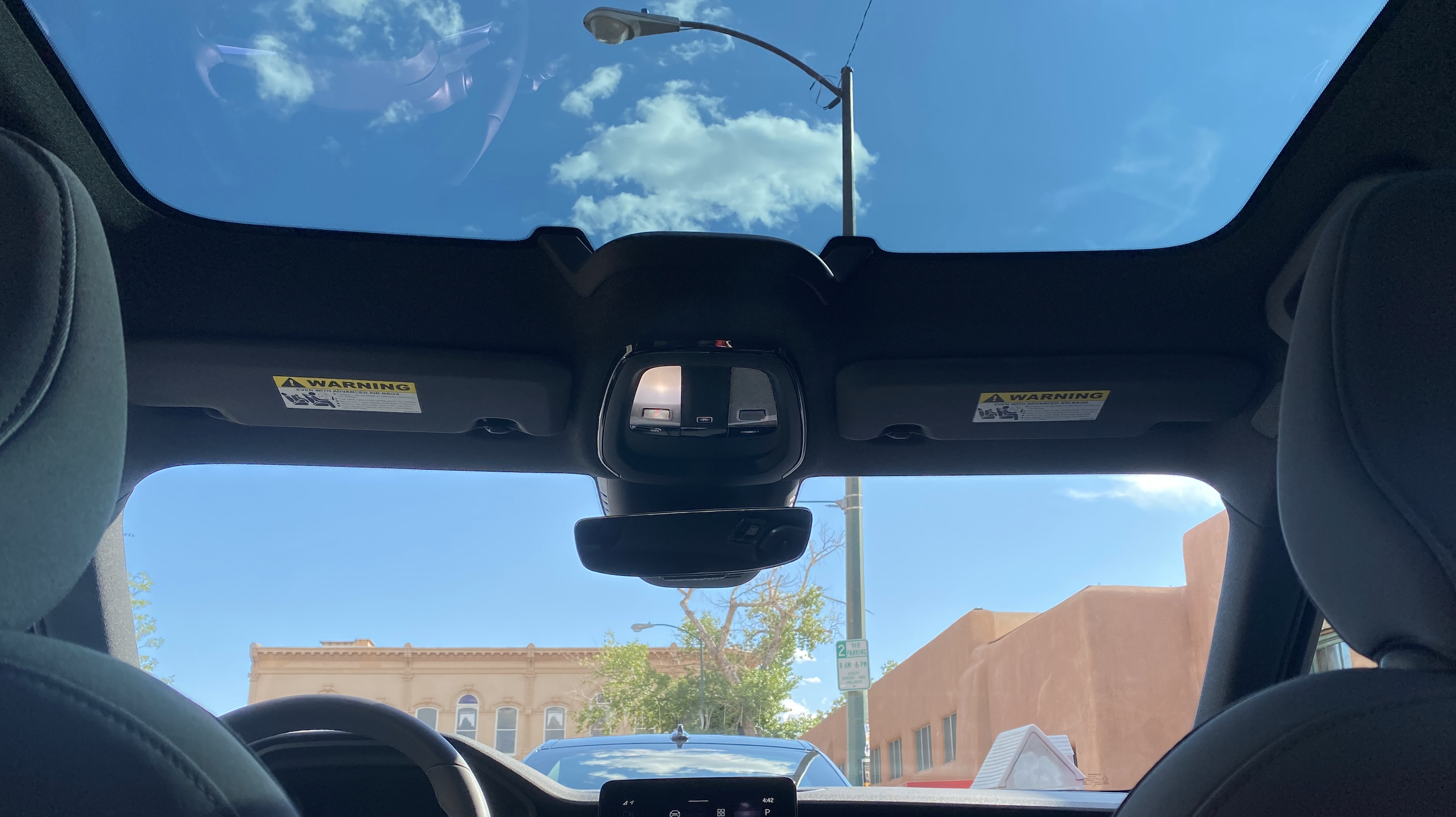
The good news is the glass roof option solved the claustrophobic issue just about completely, and dramatically changes the interior feel of the car. It opens everything up and lets in much-needed light so you can appreciate all the nice—yet simple—interior details.
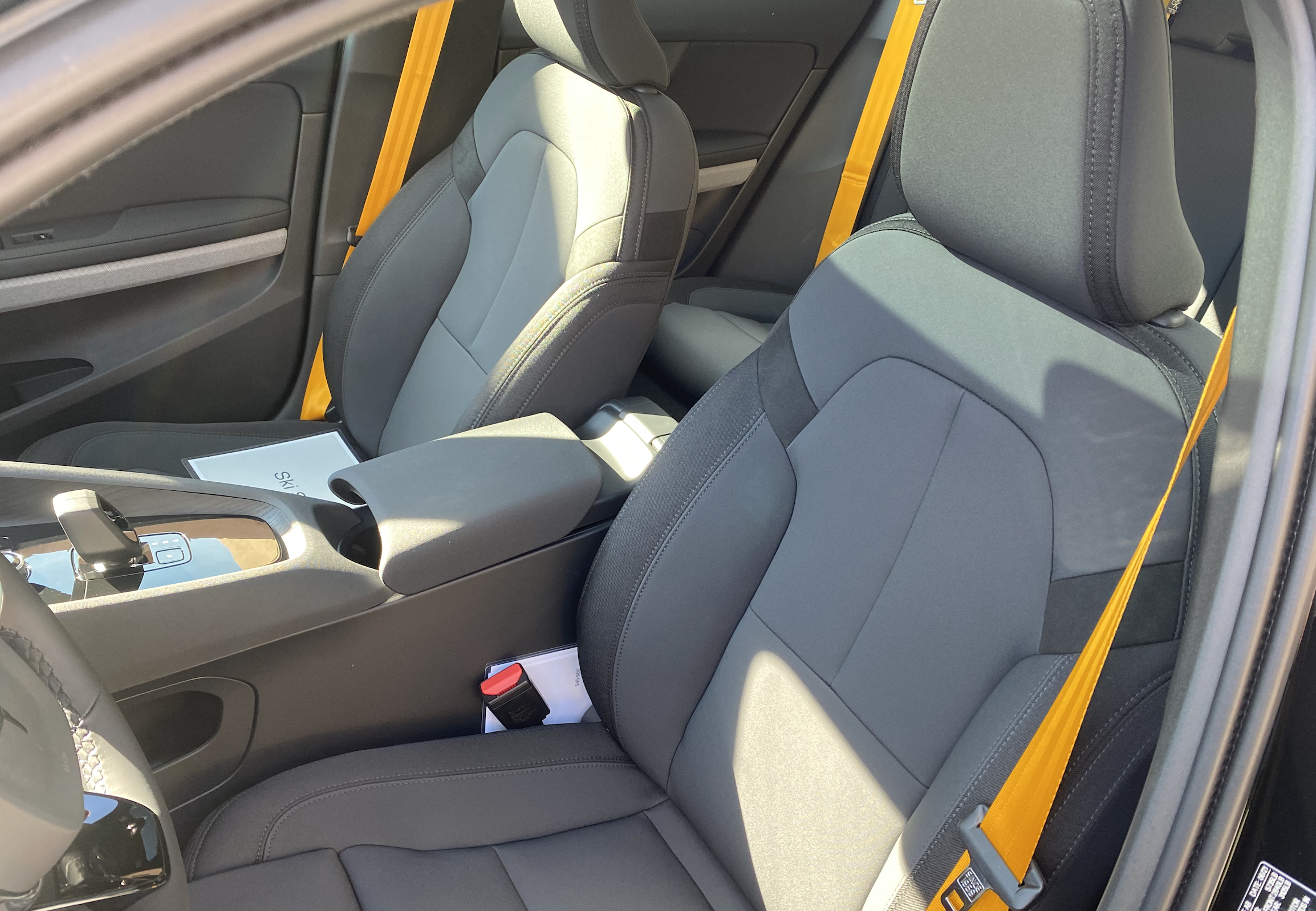
There's also the $5,000 Performance Pack option for the dual-motor car that adds, among other things, these yellow seat belts that give a much-needed splash of color in there, preventing you from having to chug a strawberry shake and then shove your finger down your throat to puke it up all over the car, just to see some color, any color.
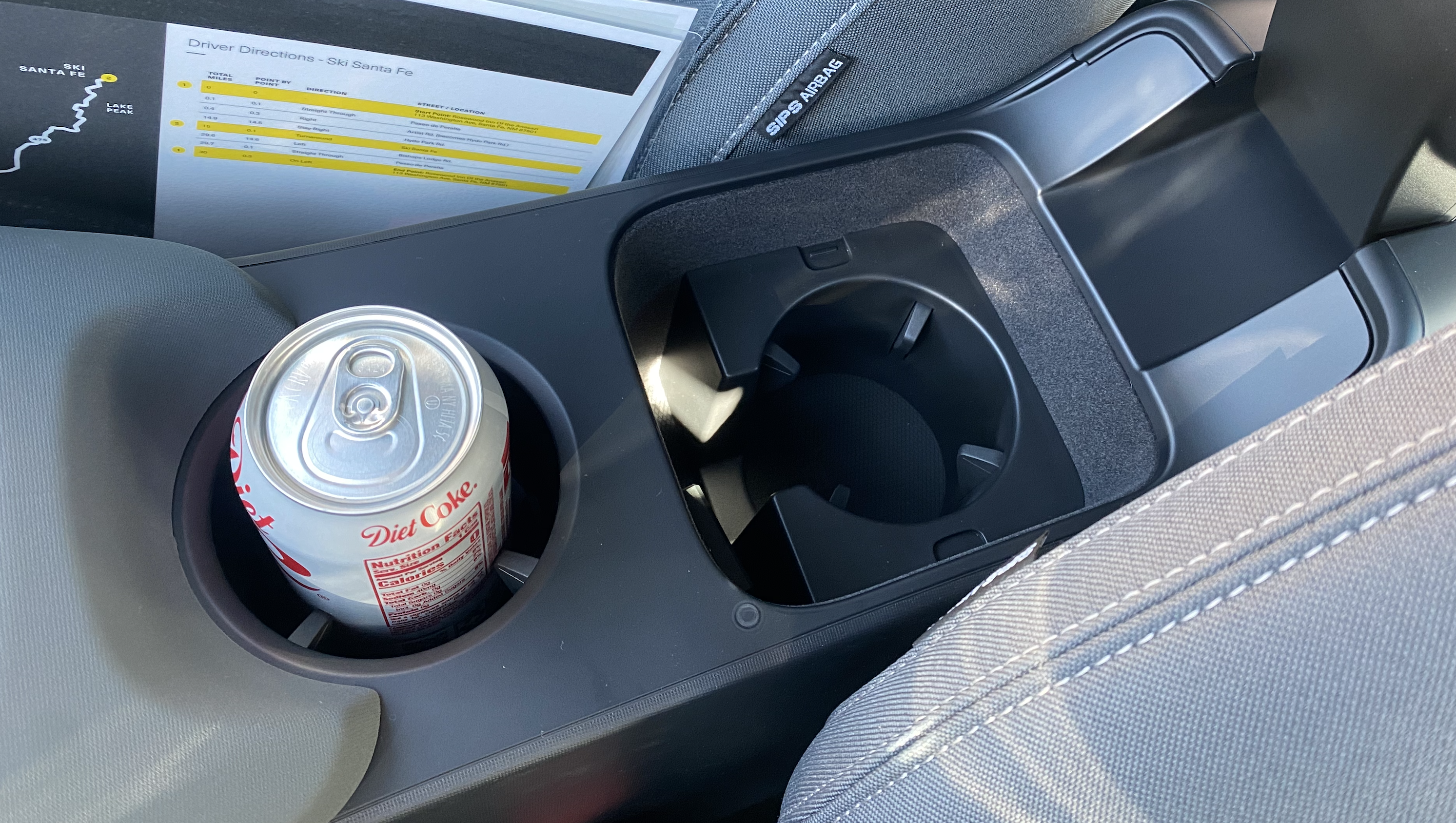
Let's talk about storage in the car, a subject that weirdly excites me. The passenger cabin has some little compartments and door pockets and similar little cubbies, but they all seem just a shade smaller than I'd like. The cupholder situation up front isn't ideal, with one exposed one, and one strangely hidden under the center armrest, like maybe you'd be ashamed for anyone to know that you sometimes may travel with more than one beverage.
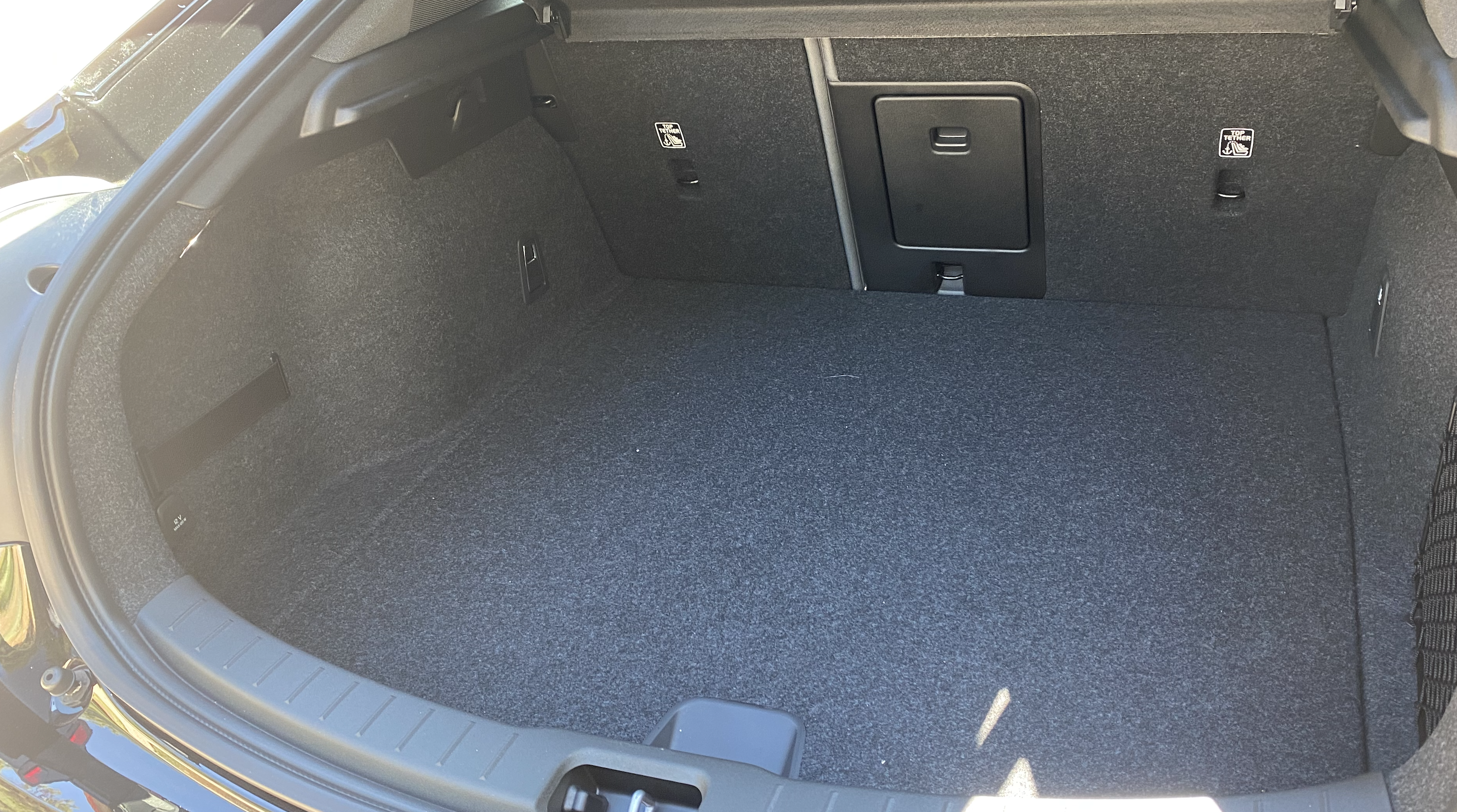
While the little-stuff-pockets situation in the car is just adequate, the luggage situation is really quite good. The rear hatch area is generously sized, and the rear seats fold pretty flat, so you could cram some pretty bulky things back there, and if you're willing to drive with the tailgate open, you could get downright trucky with what you can cram in there.
Under the cargo floor at the rear, where you might expect a lavish, decadent spare tire, you'll find a pretty roomy little trunk basement area:
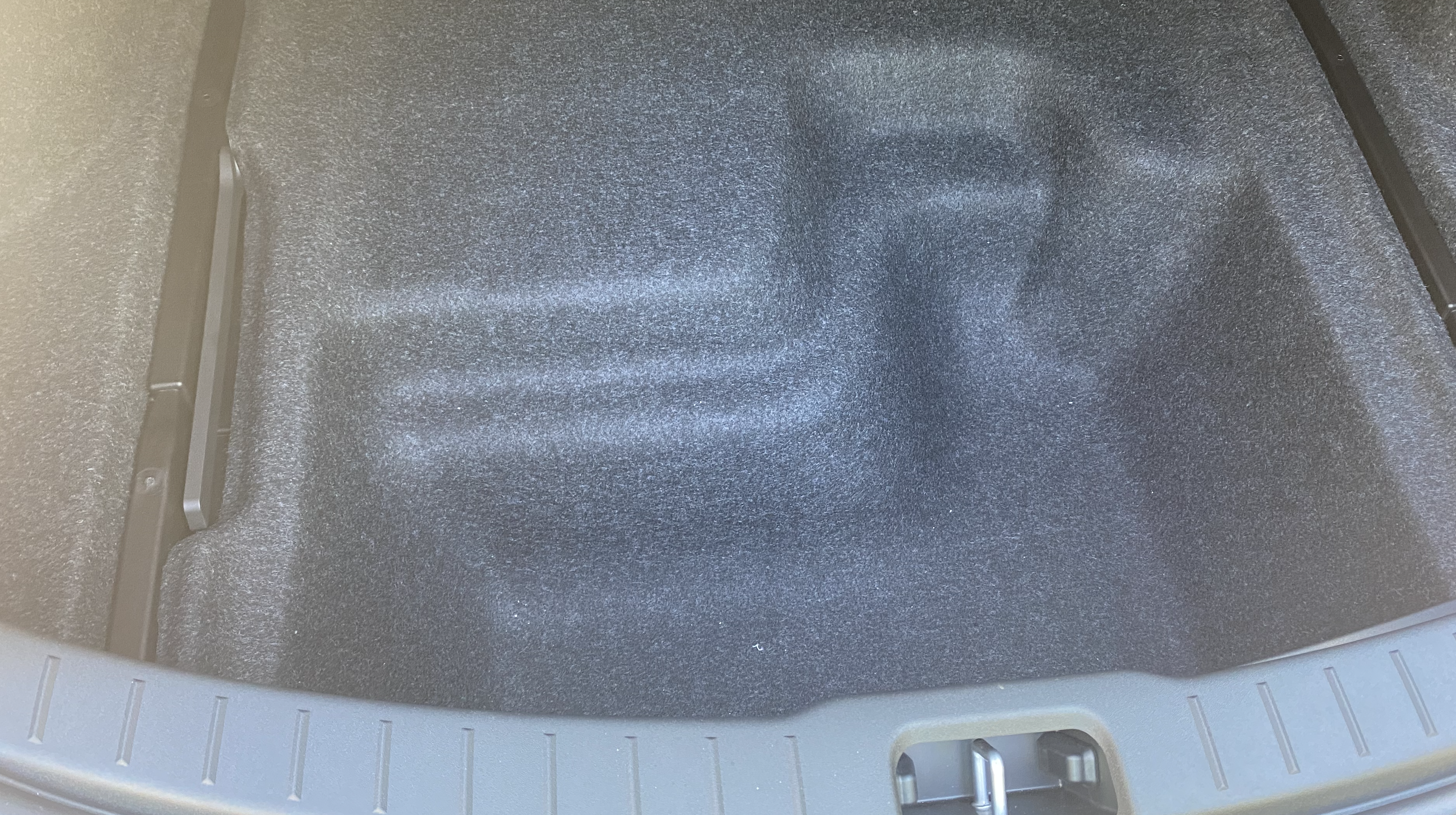
The part that really excites me is that the Polestar 2 does manage to carve out a small but usable front trunk area. It's about 1/5th the size of an air-cooled standard Beetle's trunk, if that helps a very specific set of readers understand the volume here.
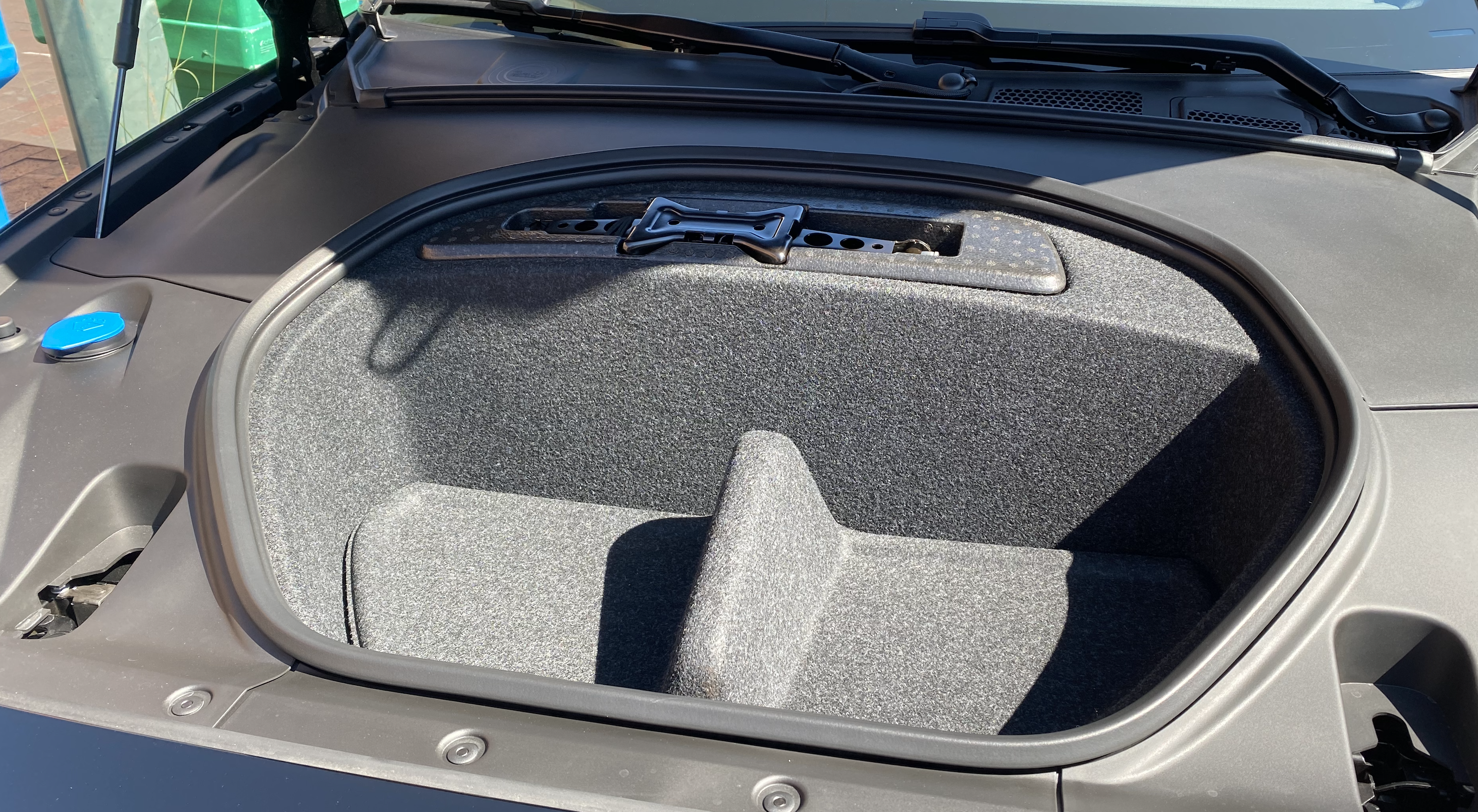
The trunk is sort of divided in half, I think to be absolutely sure a toddler won't get stuck in there (it has no internal emergency release) but it's still a usable volume for extra stuff or a great place for charging cables or whatever.
What impresses me about the fact that there's a front trunk at all is that the Polestar 2 isn't built on an EV-only battery-in-the-floor-skateboard platform—it's built on Volvo's CMA architecture, which is also the basis of combustion cars like the Volvo XC40.
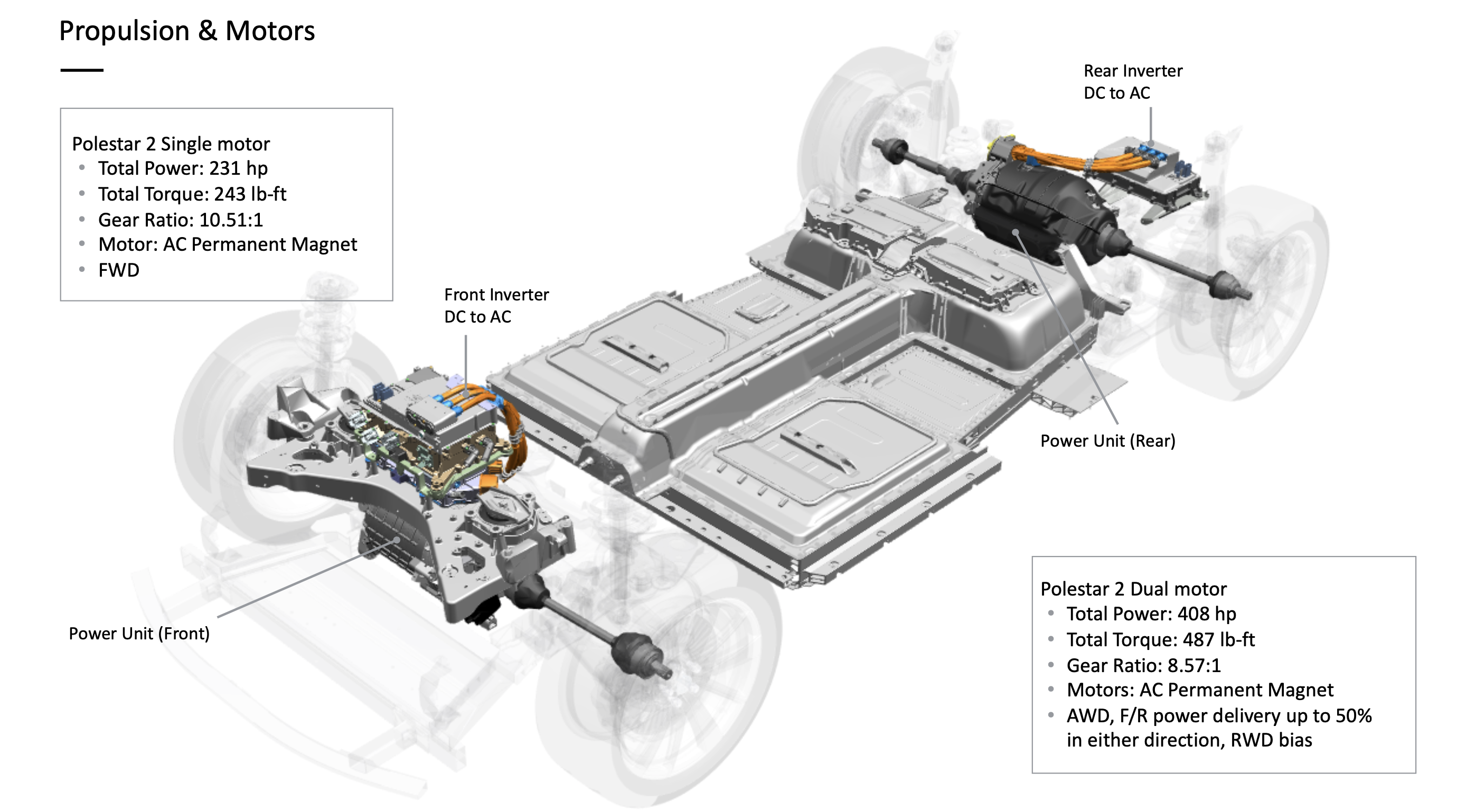
As you can see from the diagram here, it's not a flat battery pack. It's more like an H-shaped pack, but the space is still used quite well, with the divisions of the battery pack used to allow for nice deep footwells at the rear.
The fact they were able to package all the hardware up front—power unit, inverter, HVAC systems and so on, and still find volume for storage up there is impressive. Plus, on the FWD, one-motor version, I think this could be the only front motor, FWD car with a front trunk ever? Maybe there was something else, but I just can't think of a F/F car with any (non spare tire only) storage up front.
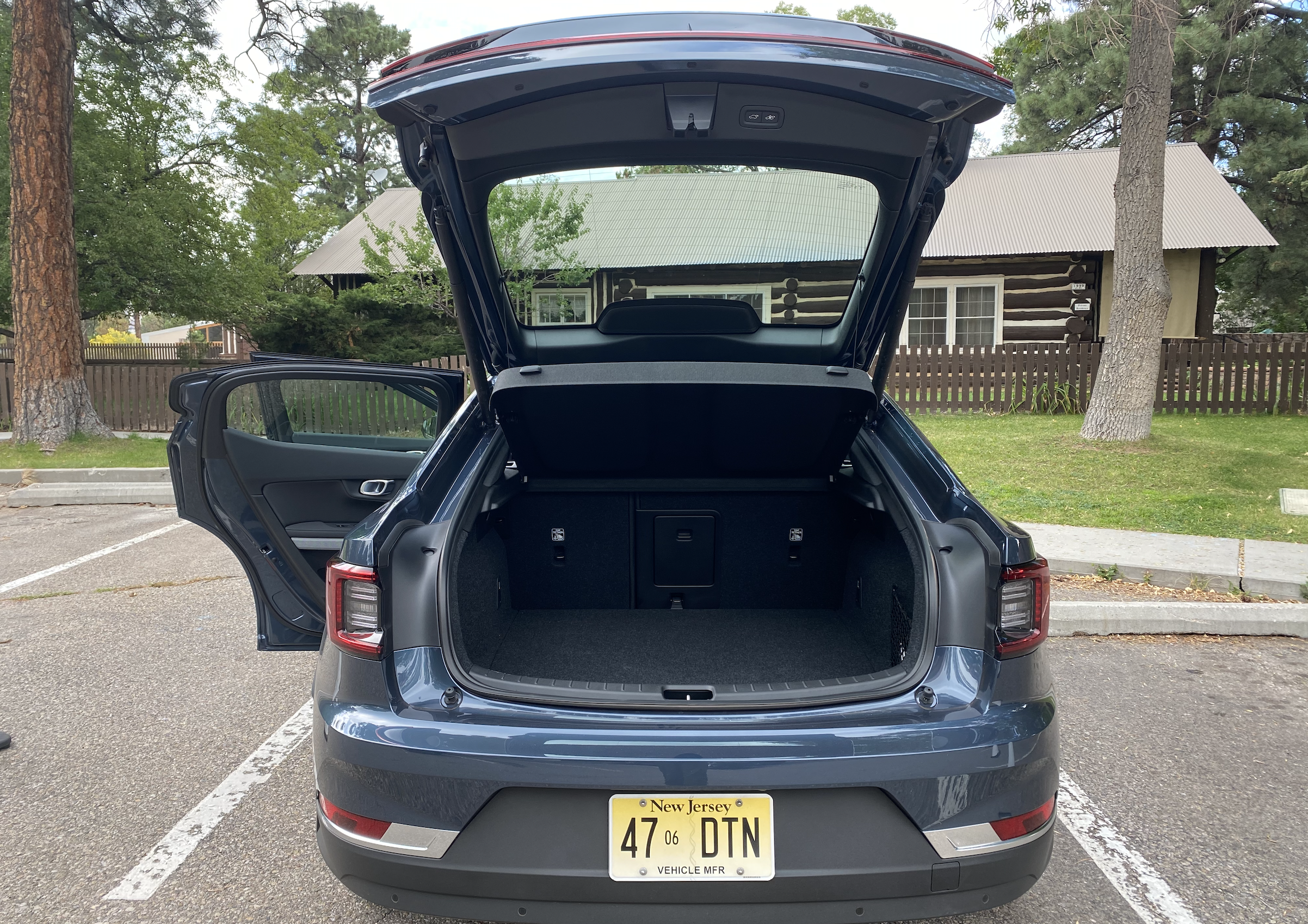
Since we've already broken out the diagrams, let's talk a little tech and how it actually drives, why not?
A little tech and how it actually drives
We'll start with that H-shaped battery pack, which has a capacity of 78 kWh, 75 of which you actually get to use. The 400V lithium battery has 27 modules, and in each of those modules are 12 pouches of delicious battery, for a total of 324 pouches.
While pouch-type batteries don't have the energy density of cell-type battery packs like Tesla uses, they do have a bit of a servicing advantage, as each of those 27 battery modules can be removed and repaired or replaced individually, without requiring the removal or replacement of the entire battery pack. This seems like a very good idea.
The battery can be charged at up to 155 kW of DC charging, a rate that will take it from 10 percent to 80 percent charge in about 33 minutes; an 11 kW home charger will take longer, of course, about 8 hours.
All of this really is only important to anyone so we can get to these numbers: The EPA says you can go 249 miles on a charge for the dual-motor Polestar 2, and Polestar says (the EPA hasn't gotten to testing this one yet) the single-motor one will go 265 miles. Those are decent numbers, spitting distance from what Edmunds got in its tests for the Tesla Model 3. Of course, I don't know what the Polestar may get in Edmund's (or anyone's) real-world testing hands, so, you know, caveat something.
Oh, and there's a new for 2022, very technical way to get 10 percent more range: Polestar has developed a fascinating new mechanical heat pump system that can, if needed, get the radiator to do the opposite of its normal job: it can pull heat out of outside air and use that heat inside the car, instead of just dissipating heat away from the car.
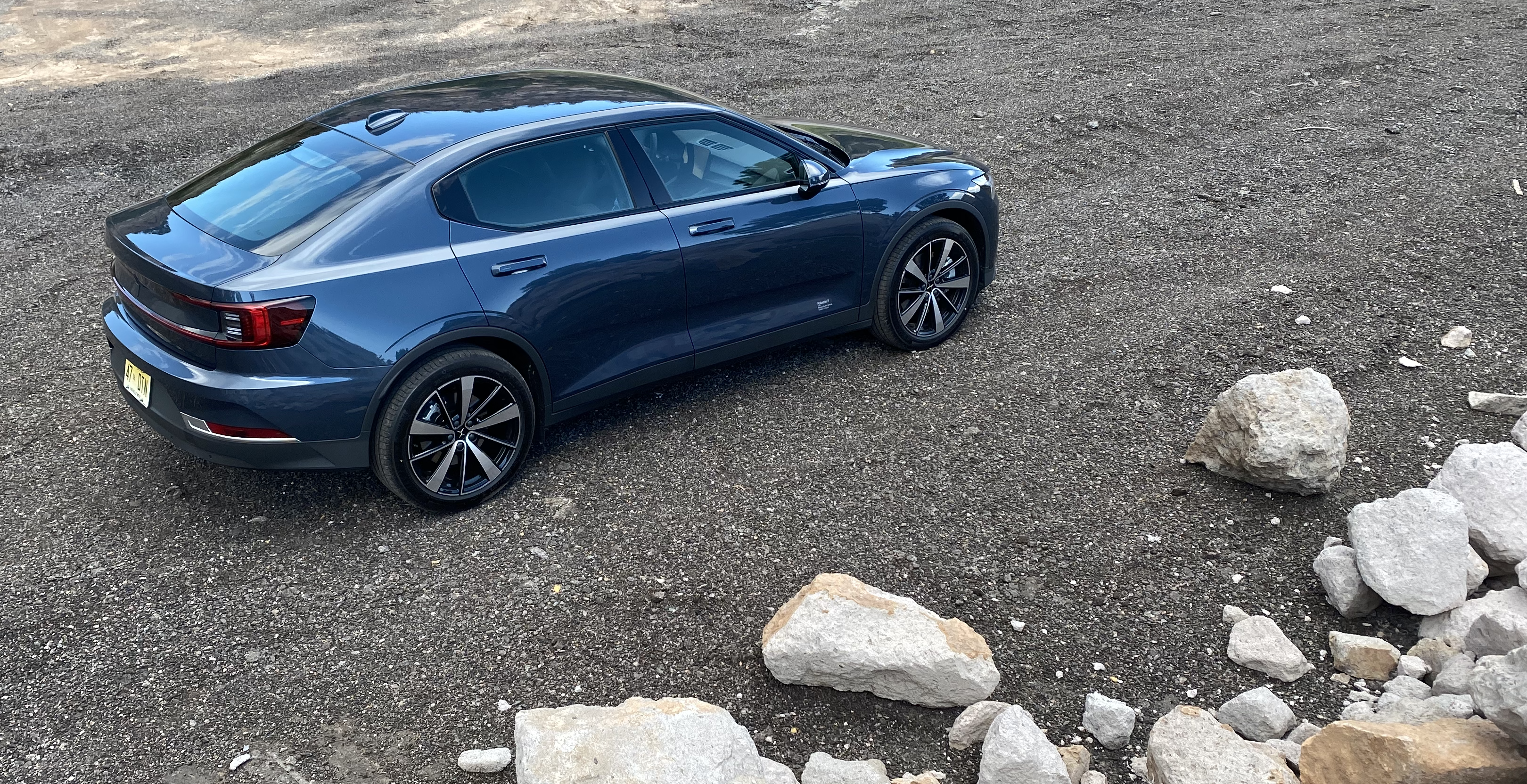
I spoke with an engineer about the system at length, and while there's too much to go into here, basically the system is able to, even in cold weather, extract ambient heat and distribute it to where it's needed instead of having to make heat from battery-expensive resistive heaters. It's pretty impressive.
Regarding performance, remember there's two main flavors of the 2: the FWD single-motor one, and an AWD dual motor one. The single motor one makes 231 horsepower and 243 pound-feet of torque, and can hit 60 in seven seconds.
The dual-motor setup jumps those numbers to 408 hp and 487 pound-feet, and that extra motor can shove it from parked to 60 in 4.45 seconds.
When driving, both cars feel quick. Sure, the dual-motor one is significantly quicker, but it's not like the FWD one feels slow, even dragging around a chonky 4,396 pounds (the dual motor is 262 pounds heavier). These cars aren't Tesla Plaid or Taycan fast, but our era of 800-odd HP EVs has made us a little slap-happy. These cars are absolutely fast enough, and the dual motor one is fast enough to get your ass in trouble.
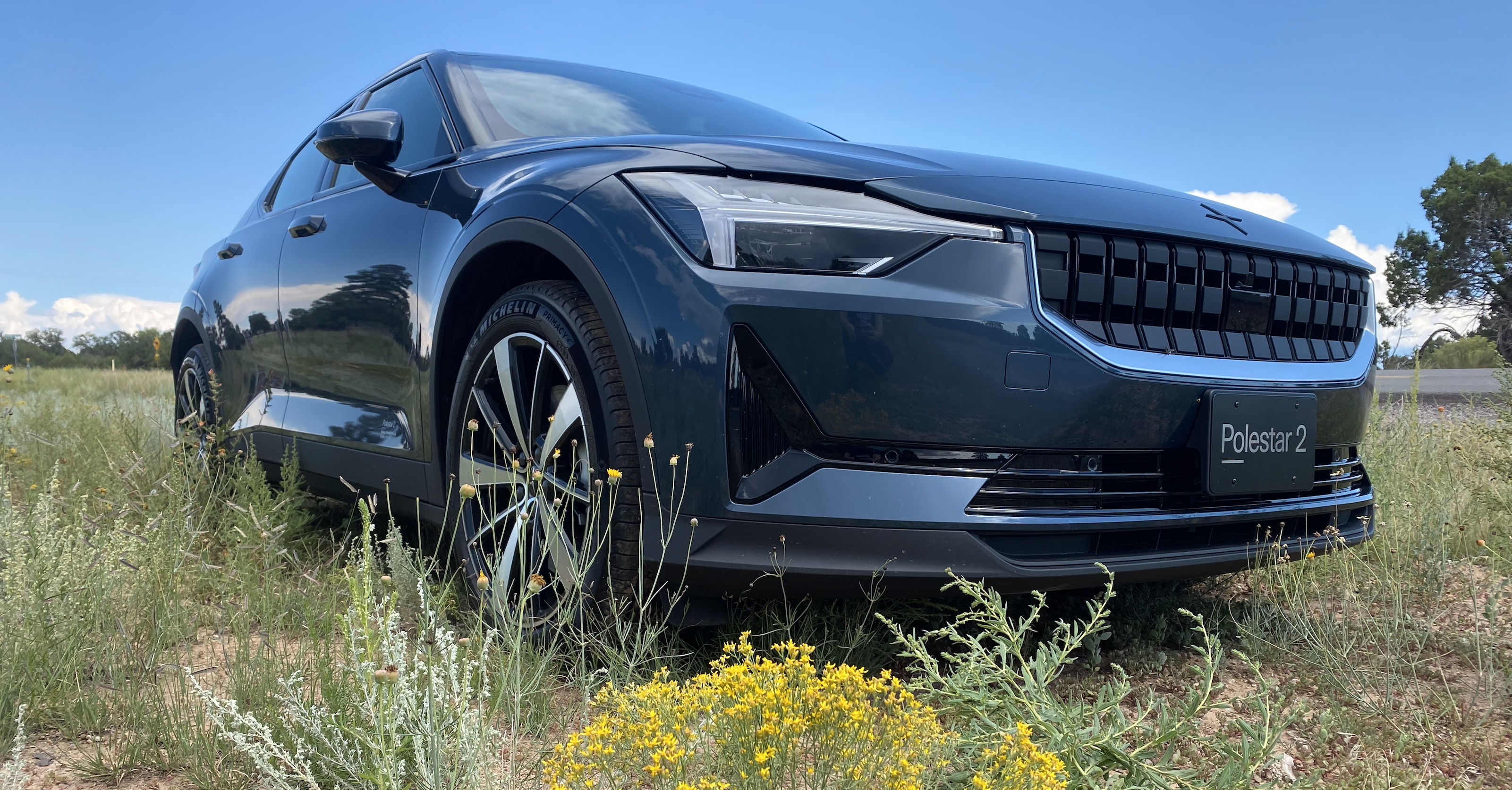
Handling-wise, the combination of that substantial heft and a well-considered front MacPherson setup and multi-link rear suspension, on good Michelin Primacy 4 tires means that the car felt in control even while really wringing it out up some curvy mountain roads.
I was trying hard to see if I could get the back to break free a bit, and when I finally did, I got a visceral surprise as the seat belt automatically tightened up hard and fast, squeezing me in an unexpected safety bear-hug that felt a little excessive, maybe even a little drama-queenish in its panic. This is Volvo underneath after all, and it's not flapjacking around when it comes to safety.
So, if you're planning on driving like a loon in one of these, I warned you.
Overall, I think the Polestar 2 drives quite well. It's got the EV-expected low-end torque, and the handling is predictable and makes you feel confident.
Electronics and UX and how this is the first car to use the Android Automotive OS
Polestar's people were very proud to say that the 2 is the very first car to use Google's new Android Automotive operating system for everything, which means that native Google services like Google Maps, Google Assistant, and the Google Play Store are all integrated right from the foundation.
This means the native navigation system uses a very nice implementation of Google Maps, and you can say "Hey Google" and get the car to do all kinds of things, like changing the radio station or switching inputs or making the car warmer or colder, or even putting on the rear defroster.
You can't turn on certain things, like headlights, or wipers, which I learned because when I asked the car to turn on the wipers, it started to play songs from the late '70s Bay Area punk band The Wipers, which isn't exactly the same thing, but can work in a pinch.
Losing cell connectivity does hobble some aspects of the system, but that's to be expected with anything that streams data, really. I did find one fun error in the infotainment system, but it's a fun one:
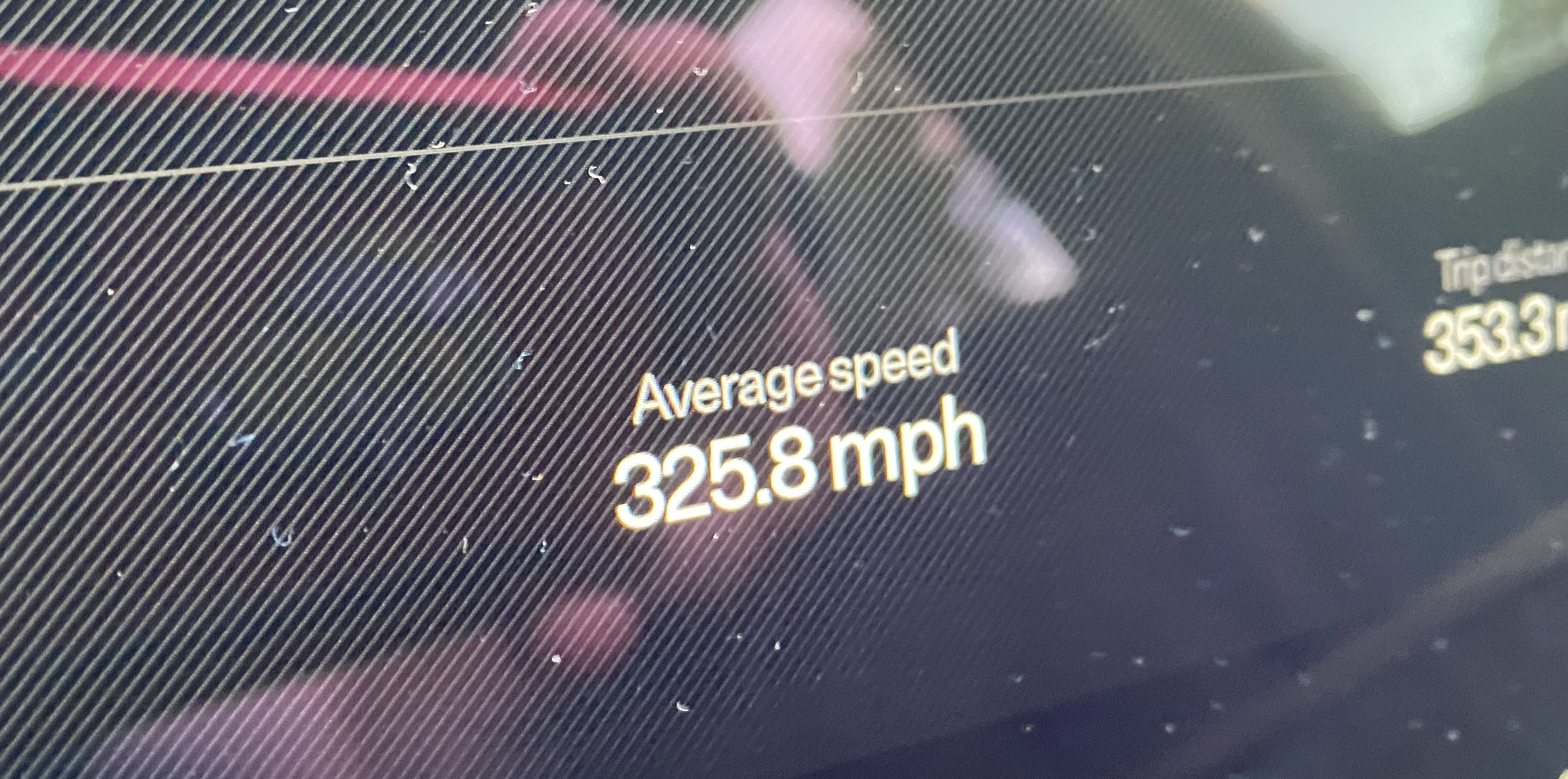
325.8 mph, and that was my average speed! Hot damn!
An engineer explained the simple reason why this (alleged) miscalculation happened and said it'd be fixed, but I don't know why he wouldn't just let me have this, dammit.
The Android Automotive user interface — skinned in the highly precise and rational design language of Polestar, here — is pretty intuitive and easy to use.
The main interface is on a center-stack screen that is almost exactly the size and shape of an Apple iPad, as you can see:
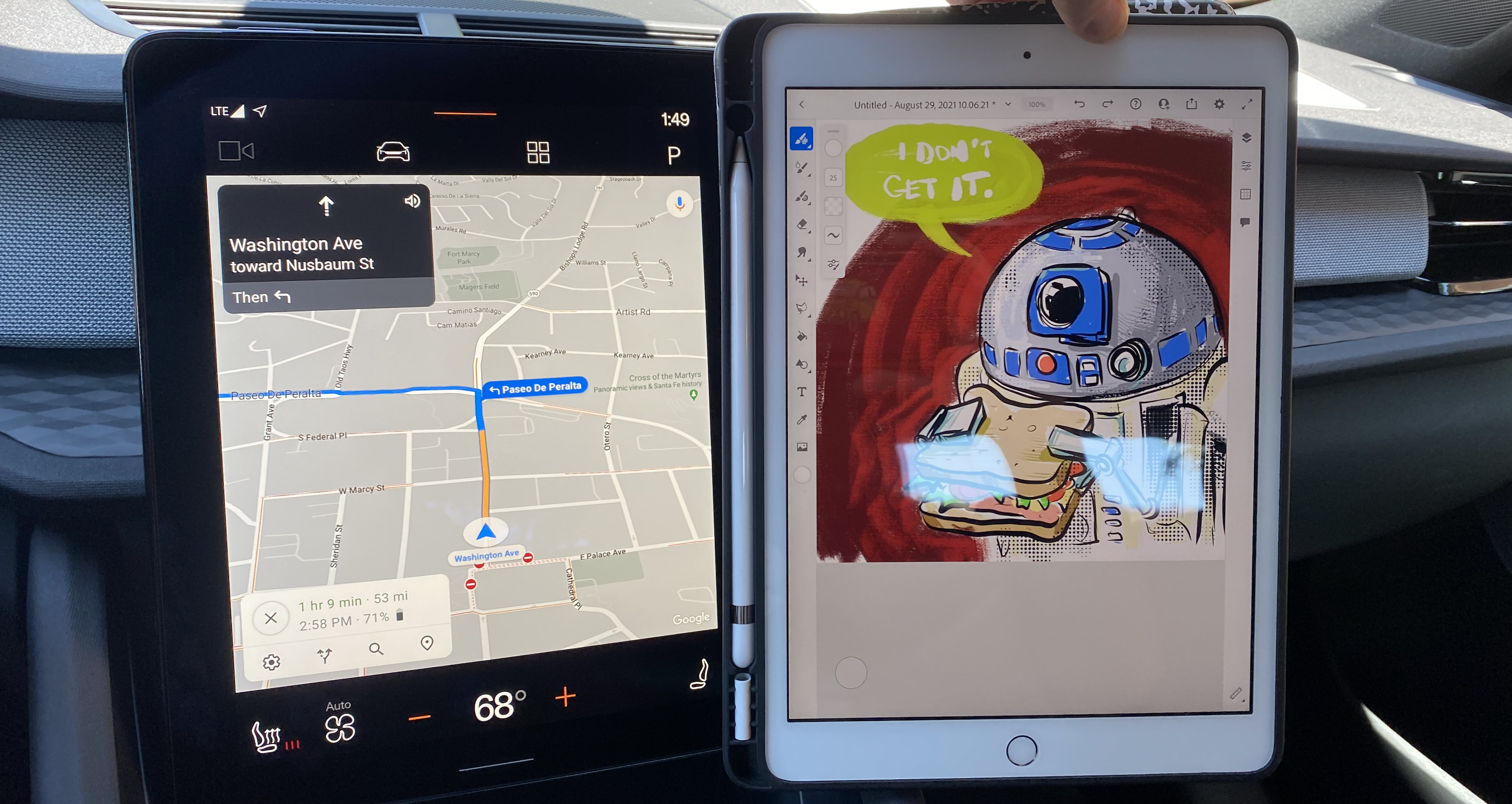
The illustration of R2-D2 not comprehending a sandwich is just a little bonus for you, because I'm a little sweet on you.
The screen is clear and very legible, and the bottom of the screen has icons for crucial stuff like climate controls, in nice big, easy-to-hit icons. There are still key physical controls, like a volume knob and a number of steering wheel buttons, so it's not all touch screen controls, which is good.
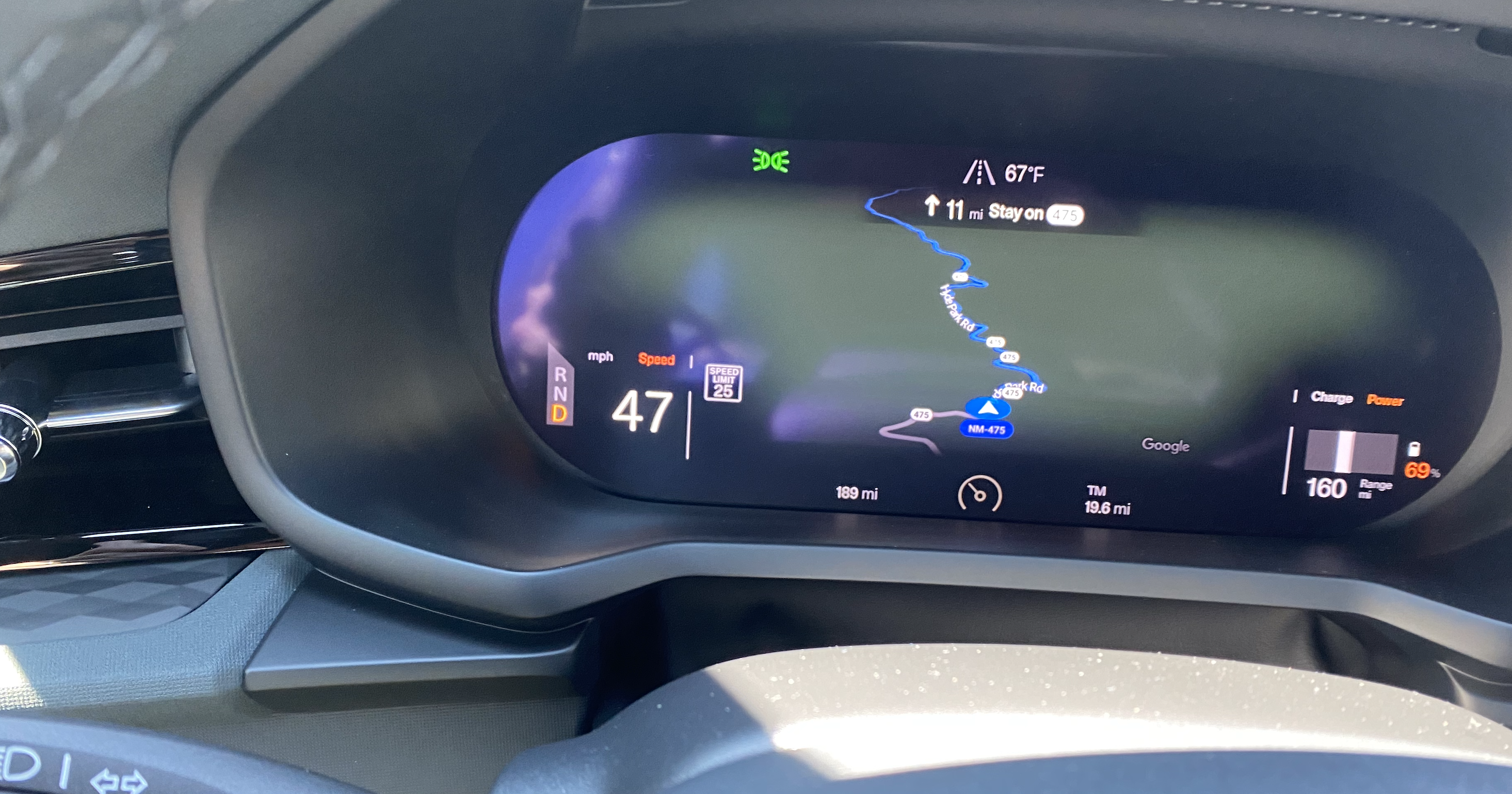
The instrument cluster's full-color LCD display is happily non-skeuomorphic and has two modes, one with a map and one with no map, but the rest of the instrumentation displays. Both were clean and very legible.
One thing that works fine but was a bit weird to adapt to is that the car has no on/off switch. If you have the key in your pocket, you just get in, put your foot on the brake, pick a gear, and go. That's it.
When you stop, you put it in park, and as soon as you open the door and get up from the seat to leave the car, it turns off. I asked and was told there is a service mode, so you can have the car "on" while you have the door open or aren't in the seat, so that's good.
In practice, it works, but does still feel a little off, and good luck explaining it to valets.
If your key's battery runs out, there is an emergency physical key inside the key fob, and a very clever hiding place for the hidden physical lock in the door handle:
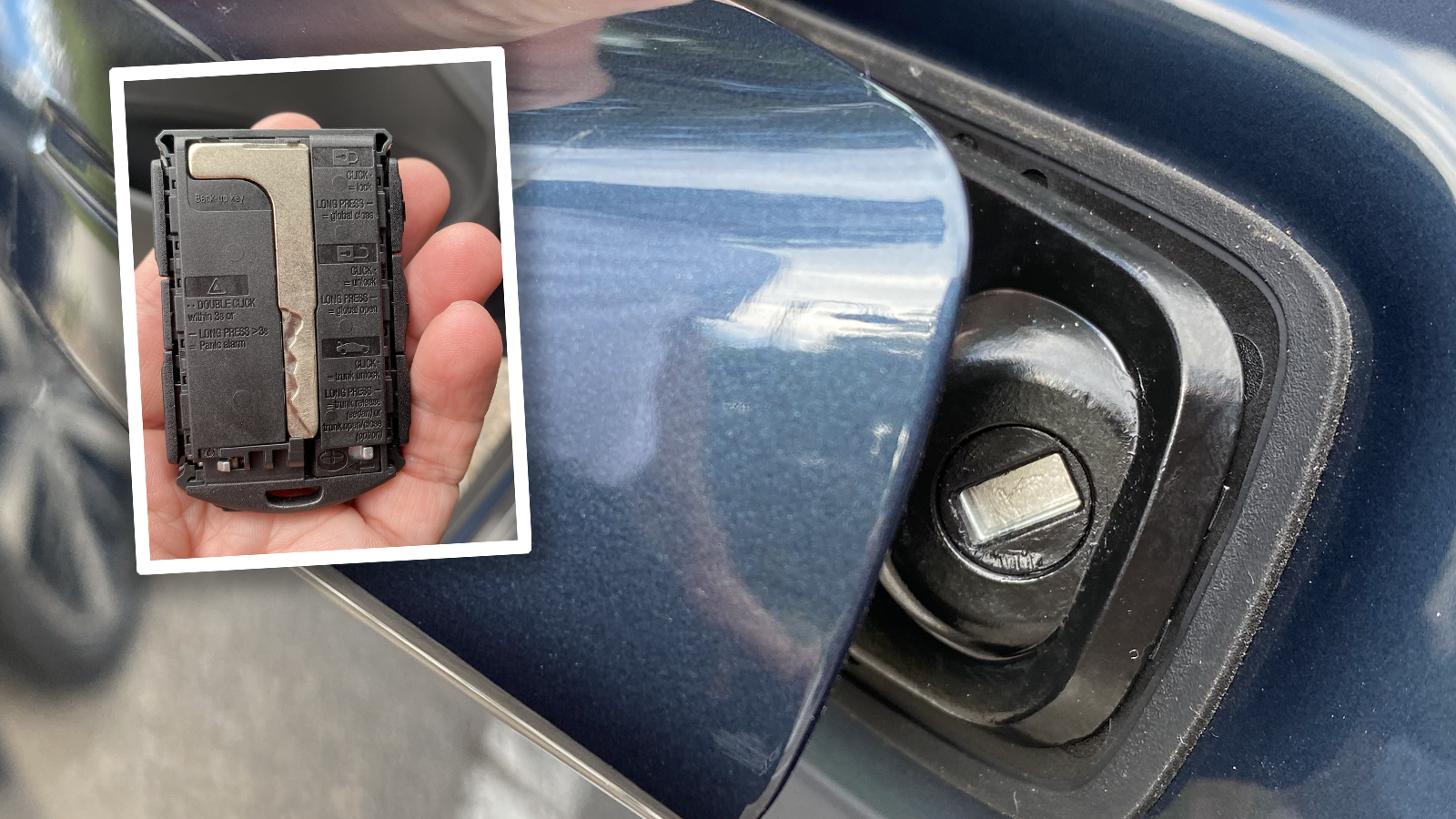
Oh, another nice little lock-related detail: This is the first car I've seen with remote-controlled child door locks. Normally, you have to open the rear door and slide a little switch, but in the Polestar 2 you have a little control on the driver's door, and it's a very good idea.
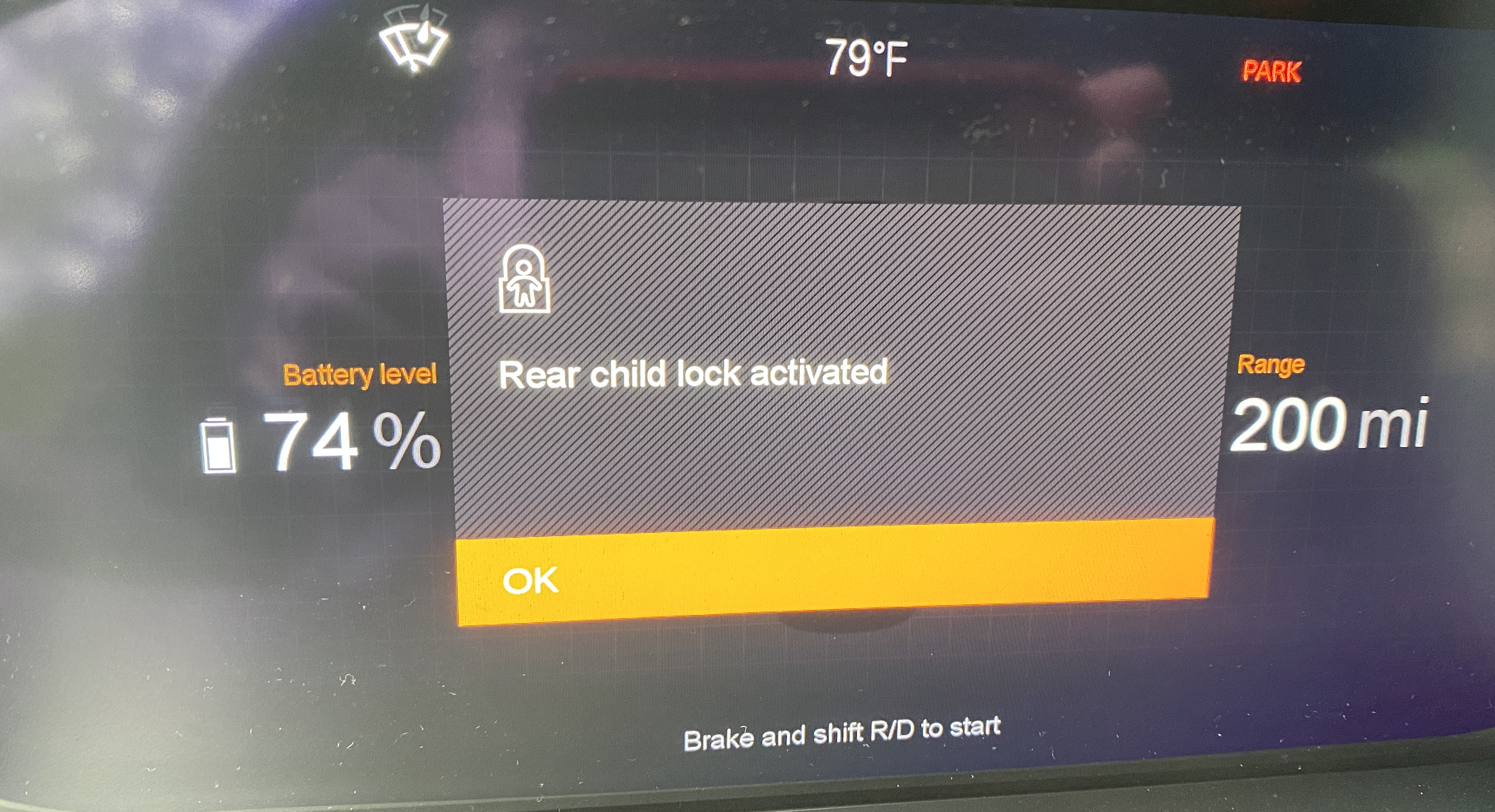
I've recently been in a position where I could have used this on one of my own cars, as my own kid no longer needs them, but we were driving a younger kid somewhere, and the little goofball opened the rear door. Even if I remembered to set the child locks before he opened the door, I'd have had to stop, get out, and set it. This system would have been vastly better.
As far as driver-assist stuff goes, the Polestar has all of the usual expected stuff: automatic emergency braking, dynamic cruise, lane centering, road sign recognition, everything up to Volvo's own basic Level 2 driver-assist system, Pilot Assist. While I think Volvo/Polestar is doing a good job keeping the expectations of the system reasonable, I have the same issues with it that I do with all L2 systems, just so you know.
I did not get a chance to test this system on this trip, so I'll have to wait to comment about it in more detail. I have used an earlier version of the system on a Volvo, and it's capable, but less comprehensive than Tesla's Autopilot, for example. It also only has steering-wheel torque sensor driver monitoring, which I do not feel is generally adequate.
Price, is it worth it, and the verdict
Let's start with price. The single-motor Polestar 2 starts at $45,900, and the dual-motor one at $49,900. There's still incentive programs for EVs that can reduce this price a good bit, but those are the baseline numbers.
There's various option packages that drive the price up, but I think overall the price is pretty fair for what you get. Spec-wise, it's not quite up to the numbers of a Tesla Model 3 in several areas, but the build quality is light years better, the service network should be better, and I think the look of the car is fantastic.
Also, Tesla does have a much superior fast-charging network, though there is potential for significant improvements in non-Tesla charging. I mean, at some point there has to be.
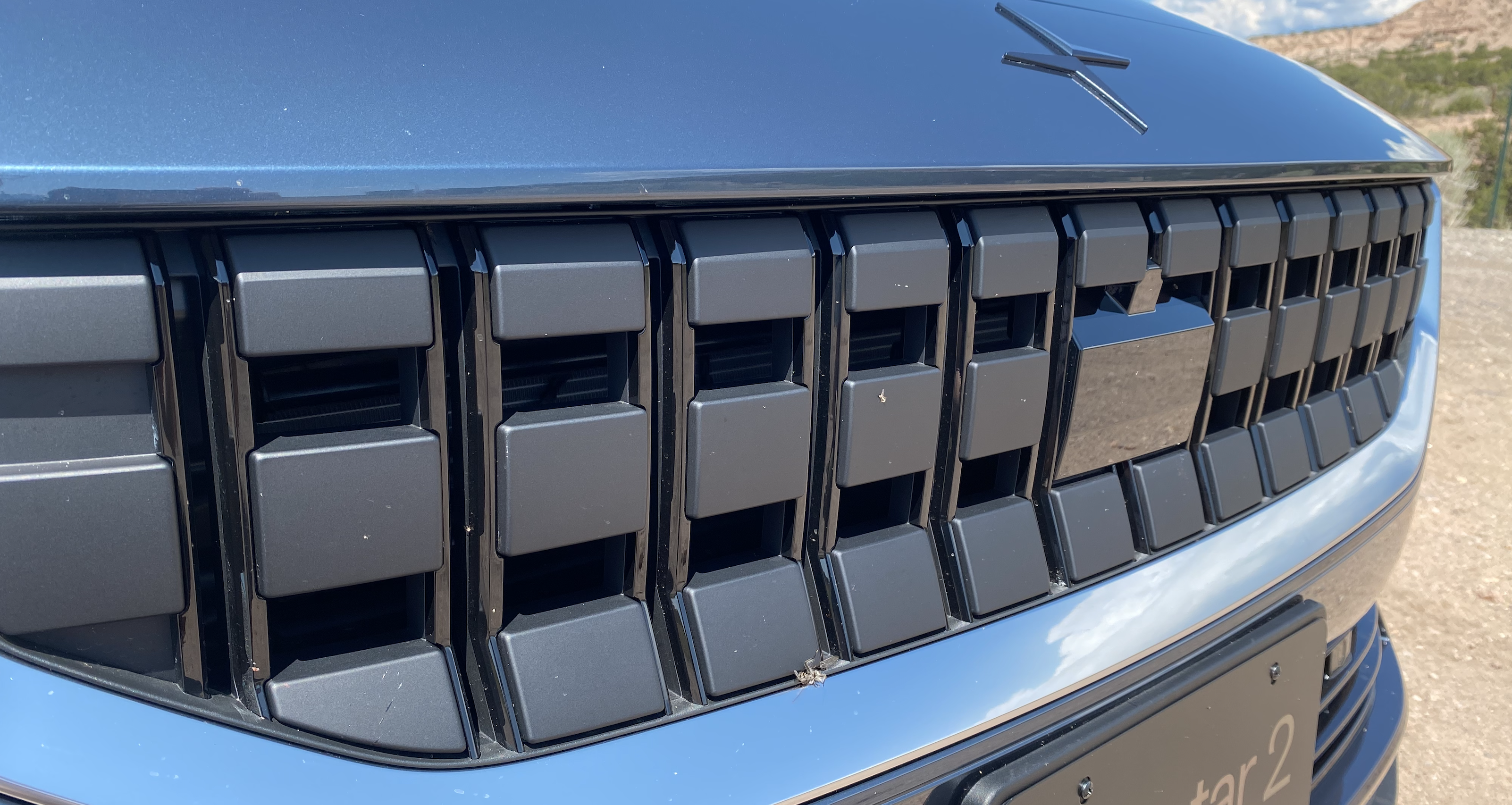
I'm let down by the absurdly limited color palette and the dark and not terribly roomy interior, but, really, those aren't huge issues in the grand scheme.
Overall, I liked the Polestar 2 a lot, and I think it's a really viable EV contender, and should find plenty of EV buyers who are attracted to the striking yet understated design and Volvo-level build quality.
Would it kill them to offer it in some colors, though?
